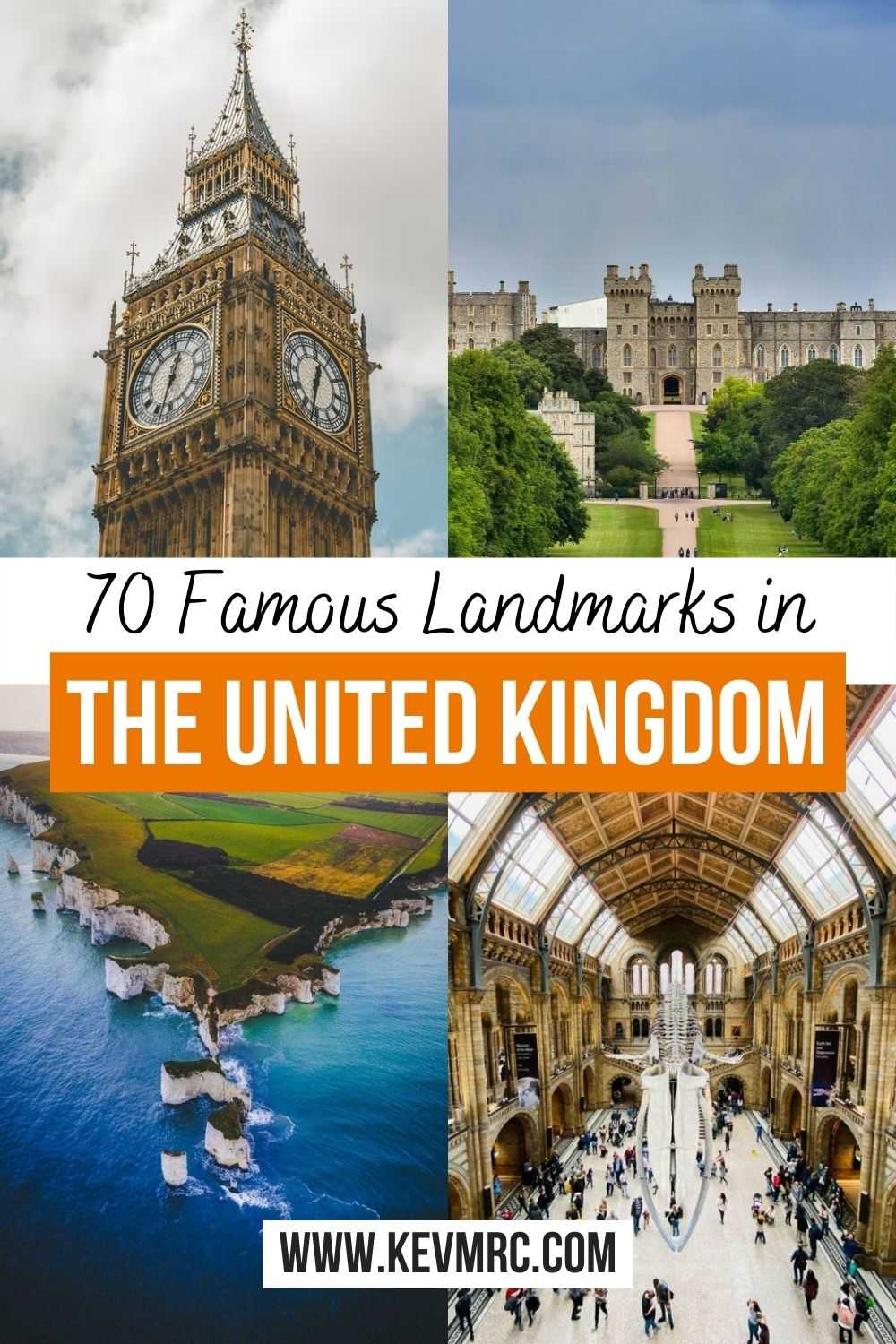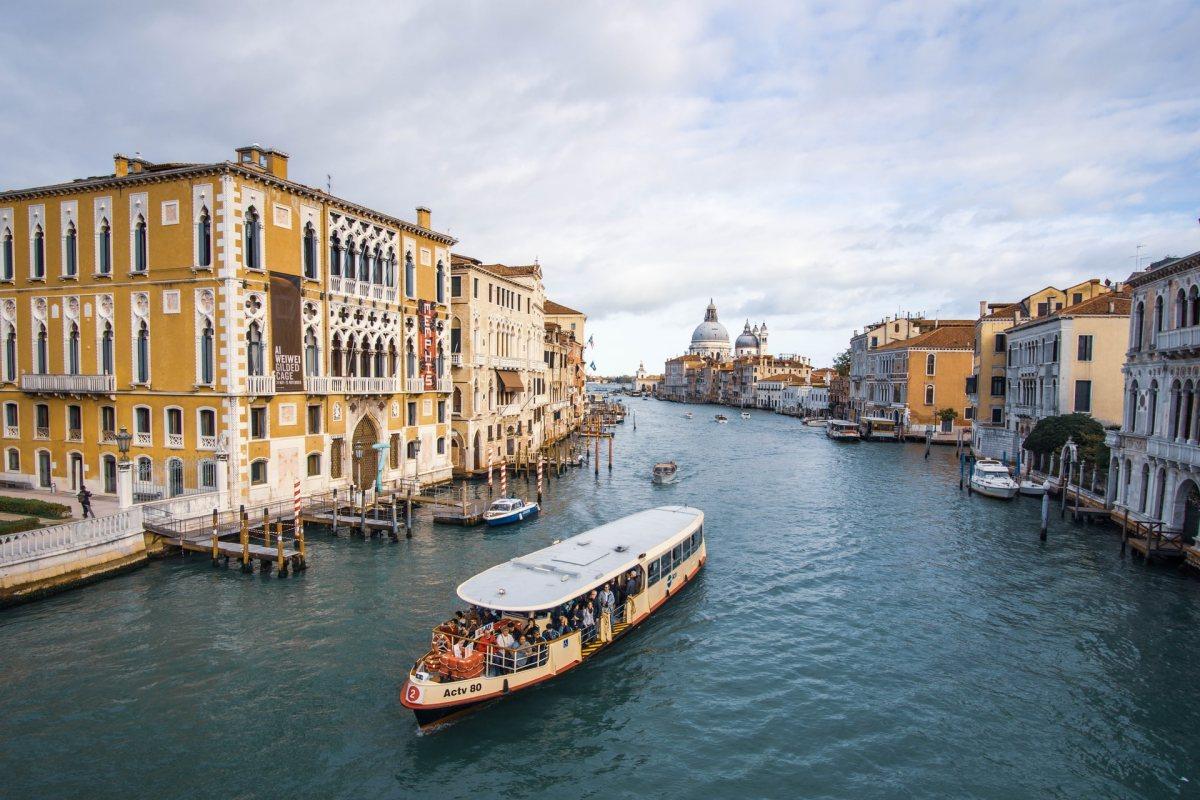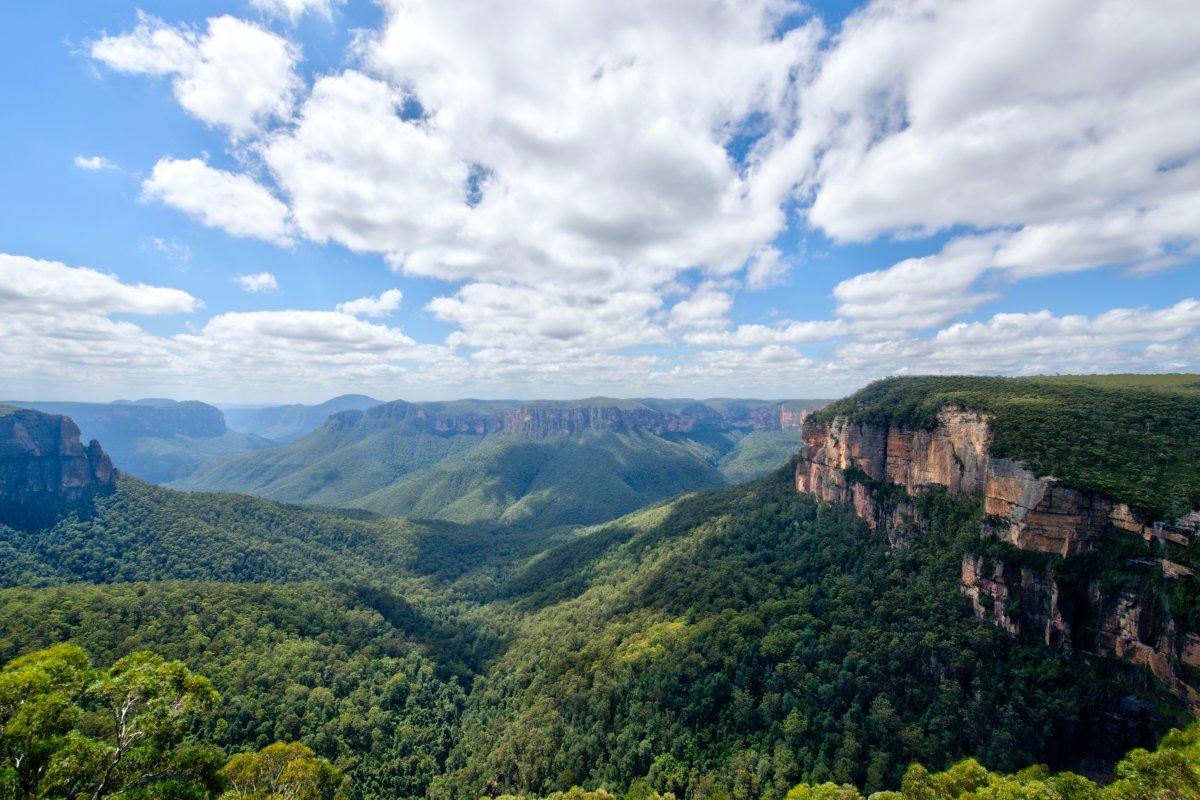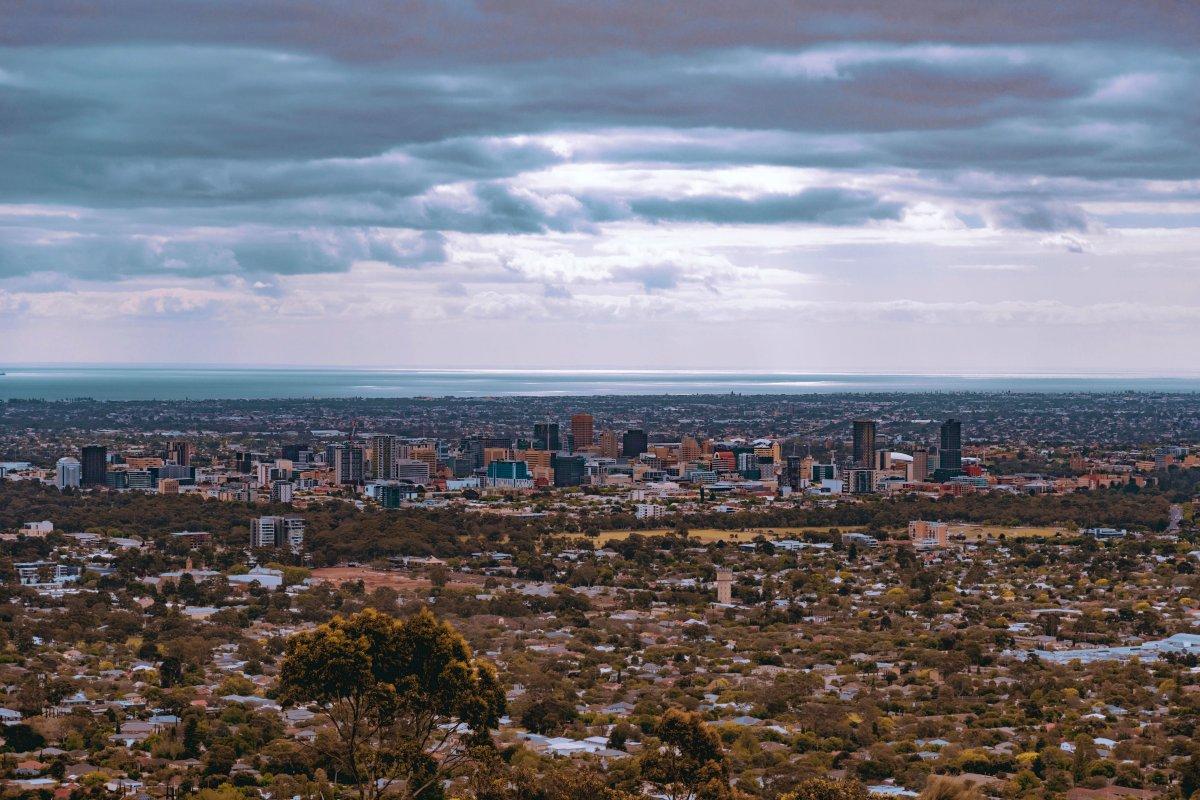70 Famous Landmarks in the UK (the best British landmarks)
The United Kingdom includes 4 countries and at least as many different trips to plan. No, the UK isn’t just England as it’s commonly referred to, but plenty of landscapes and cultures.
And although the sun doesn’t often shine, you’ll still enjoy a mild climate, beautiful green plains, picturesque villages, and of course, cosmopolitan cities.
Wondering what are the famous landmarks in the UK?
Here are 70 of the most famous British landmarks, man made and natural included! 🇬🇧
TABLE OF CONTENTS [show]
Full List of the 70 Famous Landmarks in the United Kingdom
To make it easier, we’ve divided the famous landmarks of UK into 2 categories: the man made landmarks that are all types of buildings (castles, monuments,…); and the natural landmarks that are all types of natural wonder (mountains, beaches,…).
Discover the complete list of the top 40 by category first, and then 30 more for the bravest readers.
🏛 Famous buildings in the UK:
- Big Ben
- Westminster Abbey
- Buckingham Palace
- St Paul’s Cathedral
- Tower of London
- Natural History Museum
- London Eye
- Tower Bridge
- Windsor Castle
- Hadrian’s Wall
- Royal Albert Dock Liverpool
- The Roman Baths
- Brighton Palace Pier
- Cotswolds
- Warwick Castle
- Clifton Suspension Bridge
- Caernarfon Castle
- Cardiff Castle
- St David’s Cathedral
- Edinburgh Castle
- Balmoral Castle
- Glenfinnan Viaduct
- Stirling Castle
- Dunluce Castle
- The Peace Bridge
🌳 Famous natural landmarks in the UK:
- Seven Sister
- Stonehenge
- Jurassic Coast
- St Michael’s Mount
- Peak District National Park
- Glastonbury Tor
- The Dark Hedges
- Giant’s Causeway
- Carrick-a-Rede
- Mourne Mountains
- Isle of Skye
- Glen Coe
- Loch Ness
- Pembrokeshire Coast
- Snowdonia
🔎 More famous UK landmarks:
- The British Museum
- Eden Project
- Leeds Castle
- Angel of the North
- Coventry Cathedral
- Hampton Court Palace
- York Minster
- Blackpool Tower
- Cheddar Gorge
- Anglesey Island
- Pontcysyllte Aqueduct
- Wales Millennium Centre
- Conwy Castle
- Brecon Beacons National Park
- Tintern Abbey
- Devil’s Bridge Falls
- The Royal Mile
- Scott Monument
- Arthur’s Seat
- Palace of Holyroodhouse
- St Giles’ Cathedral
- Skara Brae
- Loch Lomond
- University of Glasgow
- Callanish Standing Stones
- Mussenden Temple
- Belfast Castle
- The Titanic Belfast
- Ulster Museum
- Torr Head Scenic Road
So, here’s the full list of all the famous landmarks in the United Kingdom. Keep reading below to learn more about each of these places. 👇
Famous Buildings in the UK
You certainly already have in mind some iconic British buildings like Tower Bridge or Westminster Abbey. Of course, they’re on the list, but you’ll find out that the entire UK is full of incredible historical monuments, not only London.
Let’s discover together 25 of the most famous British buildings.
1. Big Ben
When you think about the UK, you certainly think of London’s cityscape with Big Ben overlooking the whole city, right? This is because Big Ben is the most iconic landmark in London, but also in the UK!
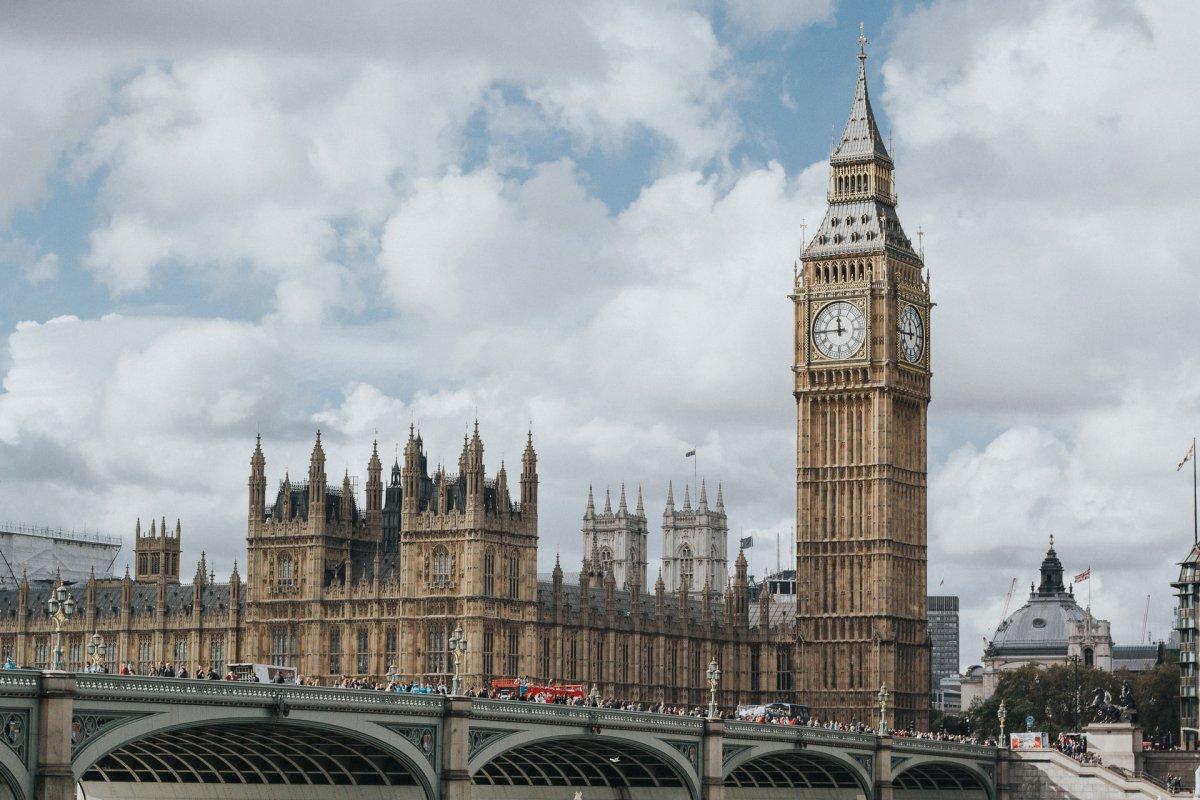
Located near the River Thames, Big Ben is a 96-meter high tower that is part of Westminster Palace, the seat of the Houses of Parliament. Built in 1858 by architect Benjamin Hall, Big Ben’s famous chimes have been transmitted for the first time by the BBC radio to announce the New Year in 1923. Since then, it became a tradition and Londoners celebrate the new year with the sound of Big Ben.
Also called the “Clock Tower”, Big Ben got renamed “Elizabeth Tower” in 2012 to commemorate the Queen’s Diamond Jubilee.
2. Westminster Abbey
Situated very close to Big Ben, Westminster Abbey is a marvel of gothic architecture and undoubtedly the most famous church in the UK.
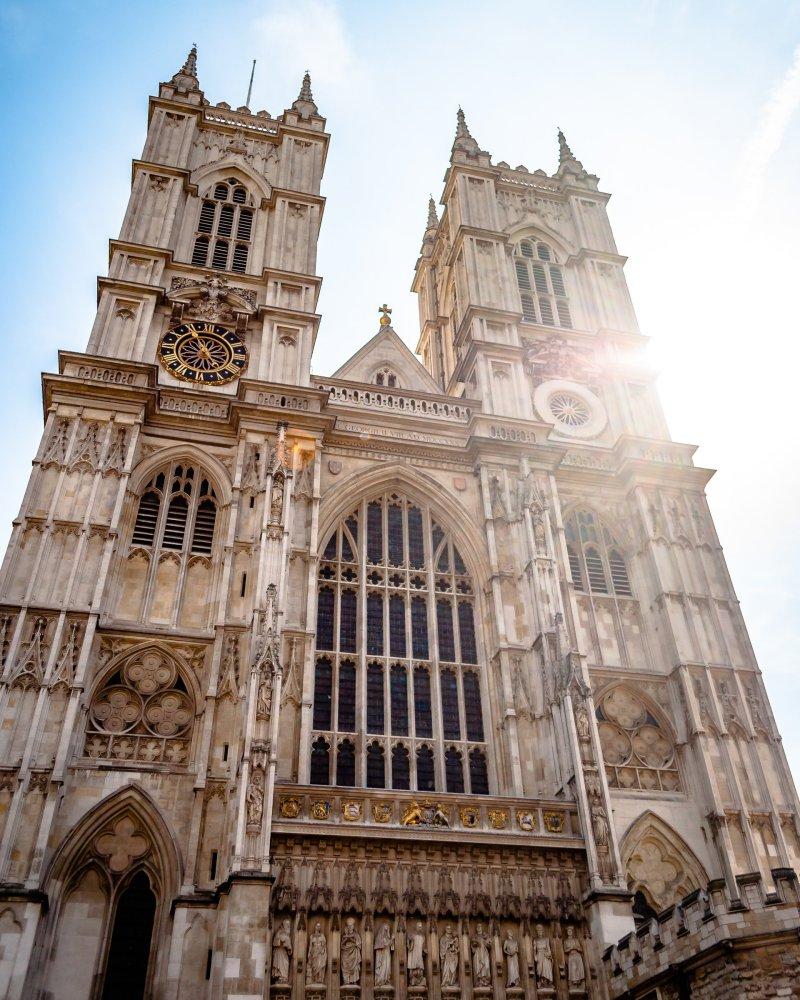
Completed in the 13th century under King Henry III, Westminster Abbey has always hosted the monarchy’s important events such as weddings, coronations, and funerals. That’s why the abbey is a major symbol of the crown.
Listed as a UNESCO Heritage Site since 1987, Westminster Abbey is home to most of England’s kings and queens burials. Visitors can also see monuments to the glory of some of the greatest historical figures including Shakespeare, Dickens, and Newton.
3. Buckingham Palace
Speaking of the British crown, this is Queen Elizabeth II’s main residence. Situated between Hyde Park and Trafalgar Square in central London, Buckingham Palace is one of the latest royal palaces still operating today.
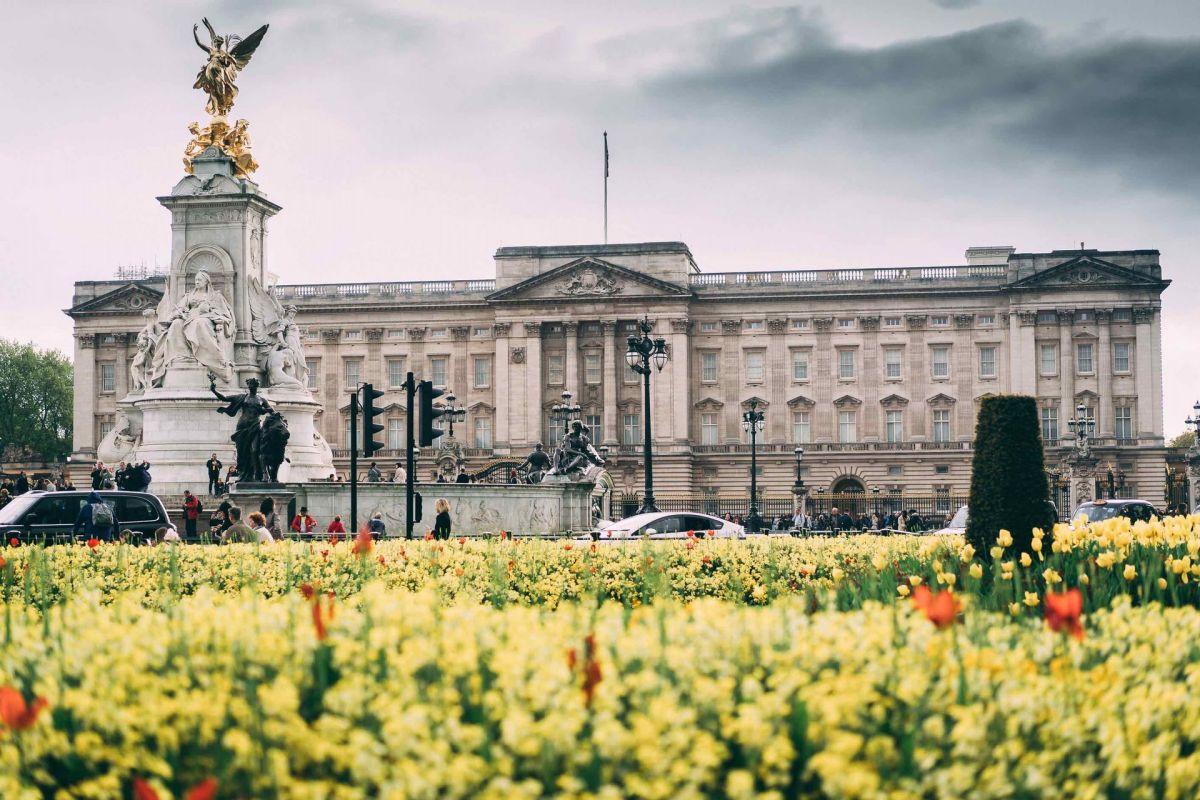
While the palace was built in the 18th century for John Sheffield (the Duke of Buckingham), it was acquired by King George III in 1762 to serve as a private residence. It wasn’t until 1837 that Queen Victoria made Buckingham Palace the official residence of British kings and queens.
It’s a major attraction in London, especially the changing of the guard that takes place every day in spring and summer, and every 2 days the rest of the year. Make sure to come early if you want to see it as the place gets crowded very quickly.
4. St Paul’s Cathedral
With about 2 million people visiting St Paul’s Cathedral every year, it’s one of the most visited monuments in London. It’s also one of the oldest buildings along with the Tower of London.
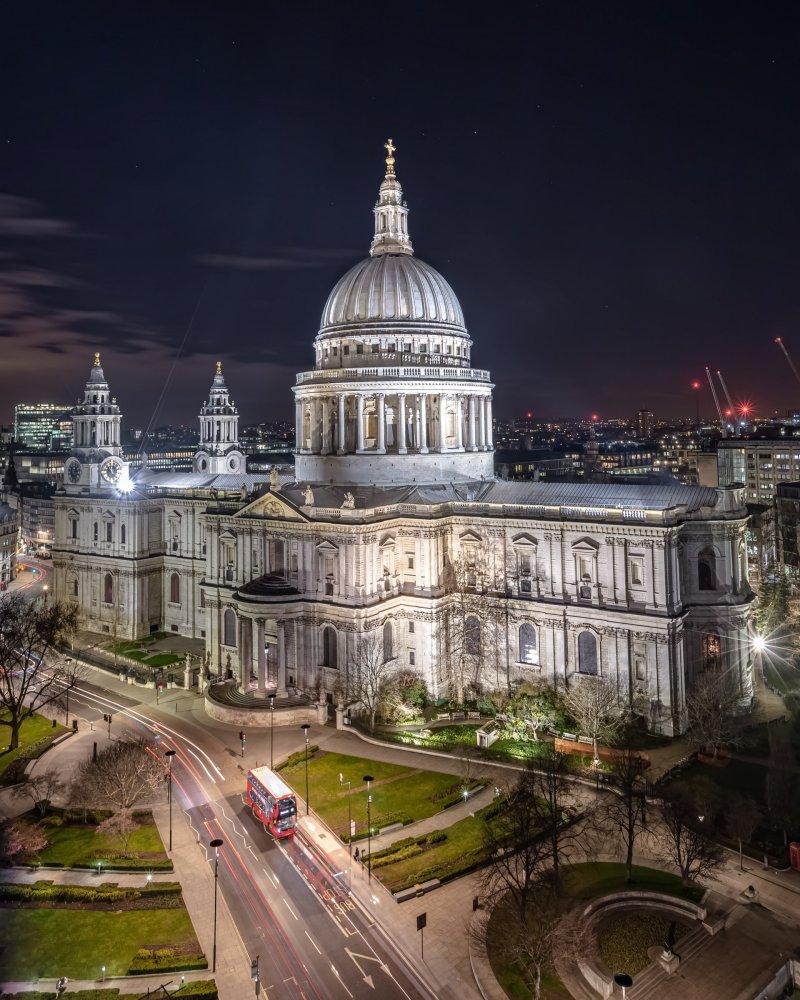
Completed in the early 18th century by Christopher Wren, the current cathedral is in fact, the 5th attempt. Indeed, the first one was built during medieval times in 604. Successively destroyed and rebuilt throughout history, the last one made in a style mixing baroque and classical architecture has finally survived.
The cathedral is a major landmark for the UK as it hosted important events such as Churchill’s funerals and Lady Di and Prince Charles’ wedding.
5. Tower of London
Located on the banks of the Thames, the Tower of London is a huge fortress established in the 11th century by William the Conqueror.
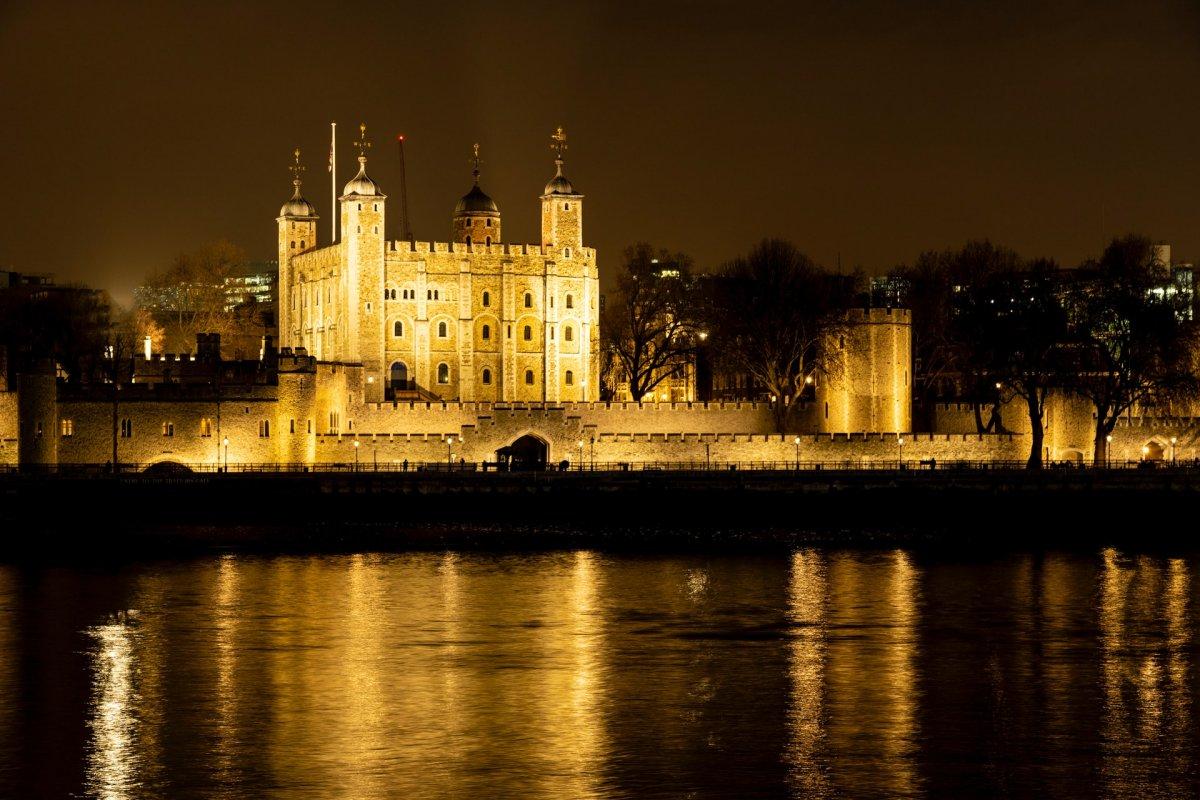
Classified as a UNESCO Heritage Site since 1988, the Tower of London has a rich history having had served as a prison, armory, menagerie, treasury, or even place of execution for 3 queens of England (Anne Boleyn, Catherine Howard, and Jane Grey).
The Tower of London is now a museum famous for housing the crown jewels and the coat of arms. Visitors can also see beautiful ornaments and some of the prettiest diamonds in the world.
6. Natural History Museum
As one of the most popular museums in London, the Natural History Museum is home to some of the most significant earth and science collections in the world, especially those of James Cook and Charles Darwin.
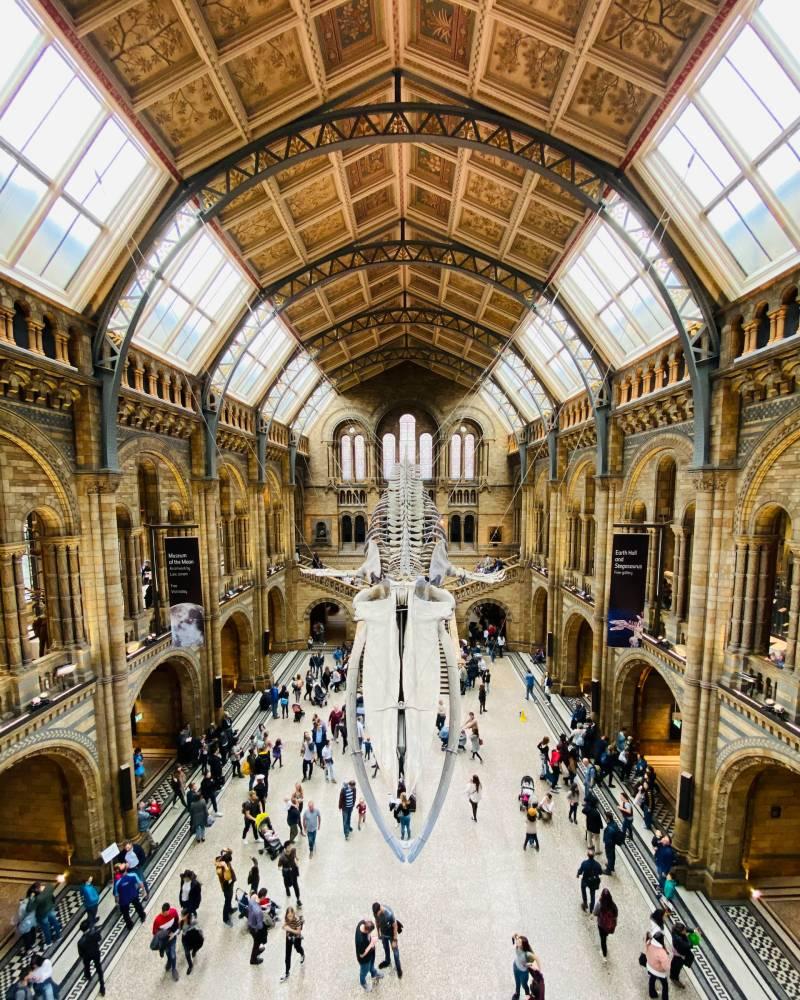
The museum is settled inside a wonderful 19th-century Romanesque building located in Kensington. The museum has 5 exhibits displaying around 70 million natural specimens of zoology, paleontology, entomology, mineralogy, and botany.
People particularly love the blue whale skeleton showcased in the beautiful Hintze Hall, the dinosaur skeleton, and the interactive exhibitions on volcanoes and earthquakes.
7. London Eye
Settled on the banks of the River Thames, the London Eye is the largest Ferris wheel in Europe with a diameter of 135 meters. It’s composed of 32 egg-shaped capsules, each one representing a county of the UK.
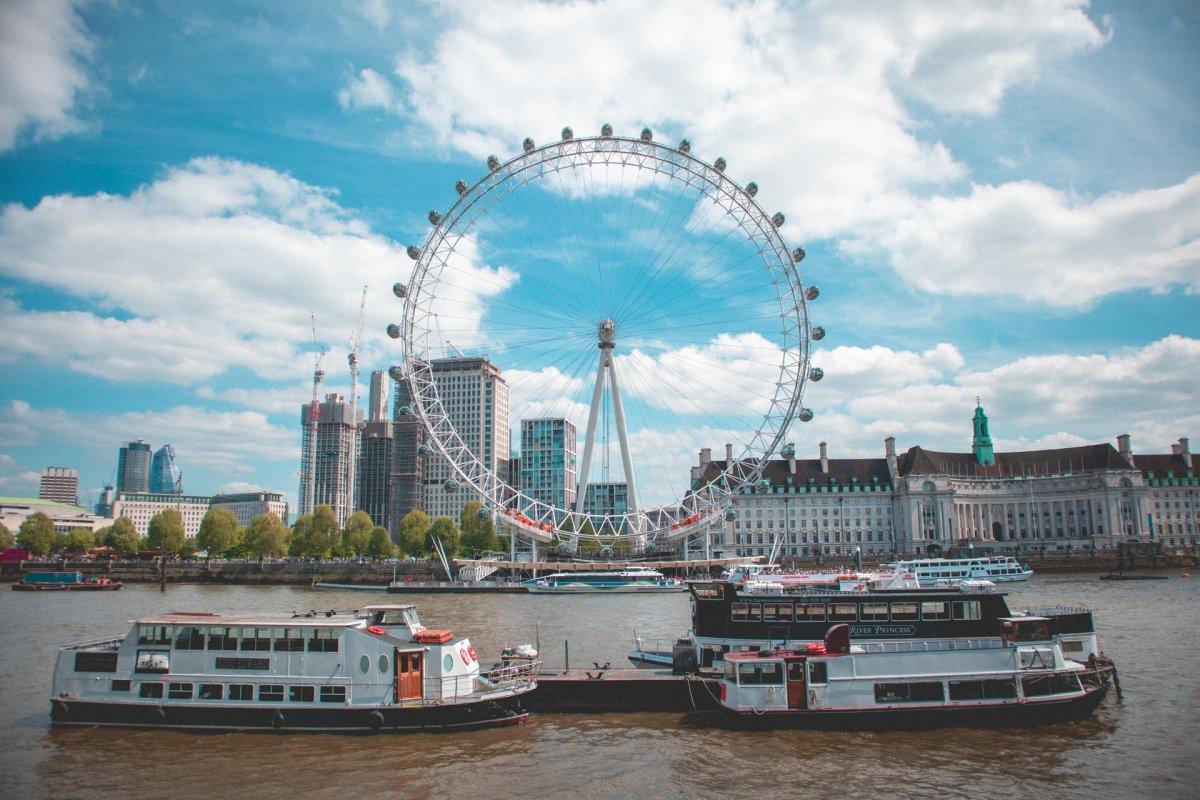
With a capacity of 25 people per cabin, the wheel can accommodate up to 800 people at a time! The wheel doesn’t have to stop to let passengers on as it turns very slowly and the ride lasts 30 minutes. From the cabin, you can enjoy one of the best panoramic views of London.
Opened in 2000, the London Eye has become one of the best attractions in London with about 3,5 million visitors every year.
8. Tower Bridge
This is another iconic landmark of London. Overlooked by the Tower of London, the Tower Bridge spans the River Thames and connects the boroughs of Tower Hamlets and Southwark.
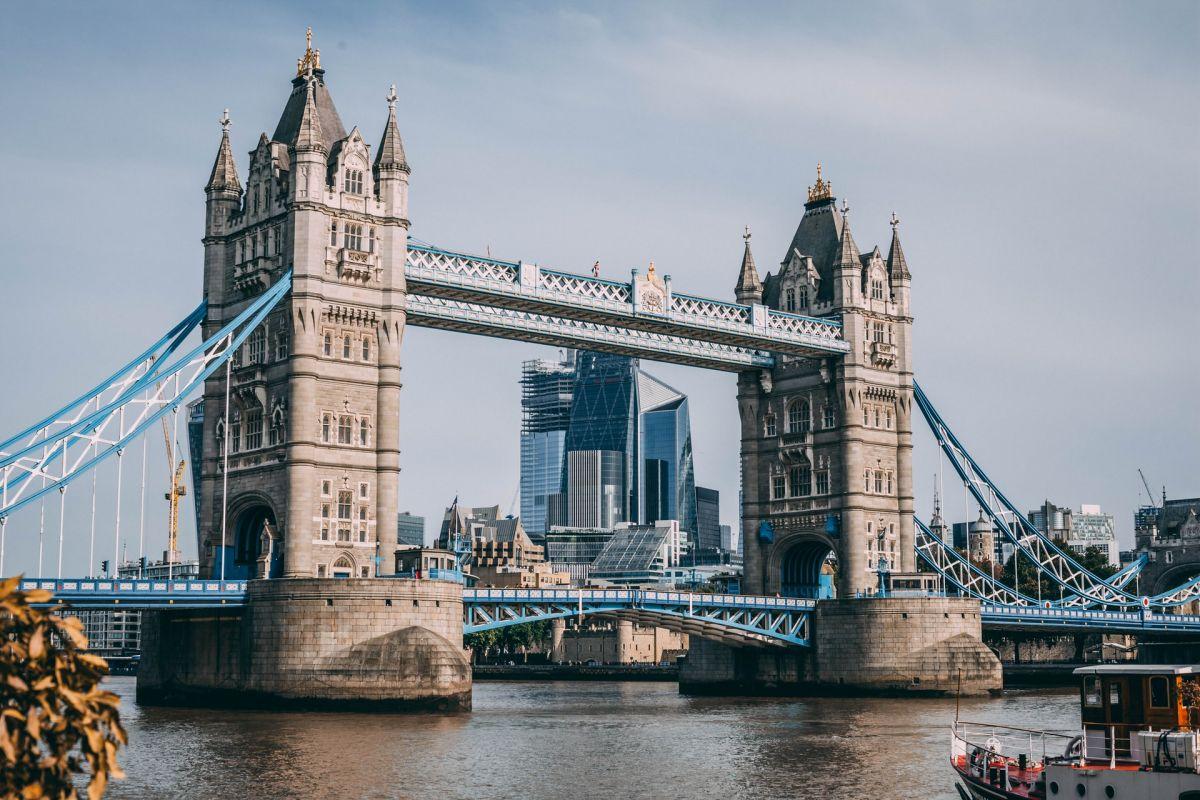
Built at the end o the 19th century, the Tower Bridge used to be the most sophisticated bridge at this time especially because of its lifting system (the lower walkway lifts to enable large ships to pass). The bridge lifts about 800 times a year, and it became a true show that people love watching.
When strolling through London, you’ll easily recognize it because of its blue frames and massive gothic-style towers. You can enter these towers as they house a museum dedicated to the bridge’s construction. But people definitely prefer crossing it on the pedestrian upper footbridge to admire the view.
Wondering how to get around in London to discover all these treasures? Check out coach tickets and more here.
9. Windsor Castle
Windsor Castle is the world’s largest occupied castle, as well as the oldest royal residence. Situated 50 kilometers from London, Windsor Castle has been the home to generations of British kings and queens for 900 years.
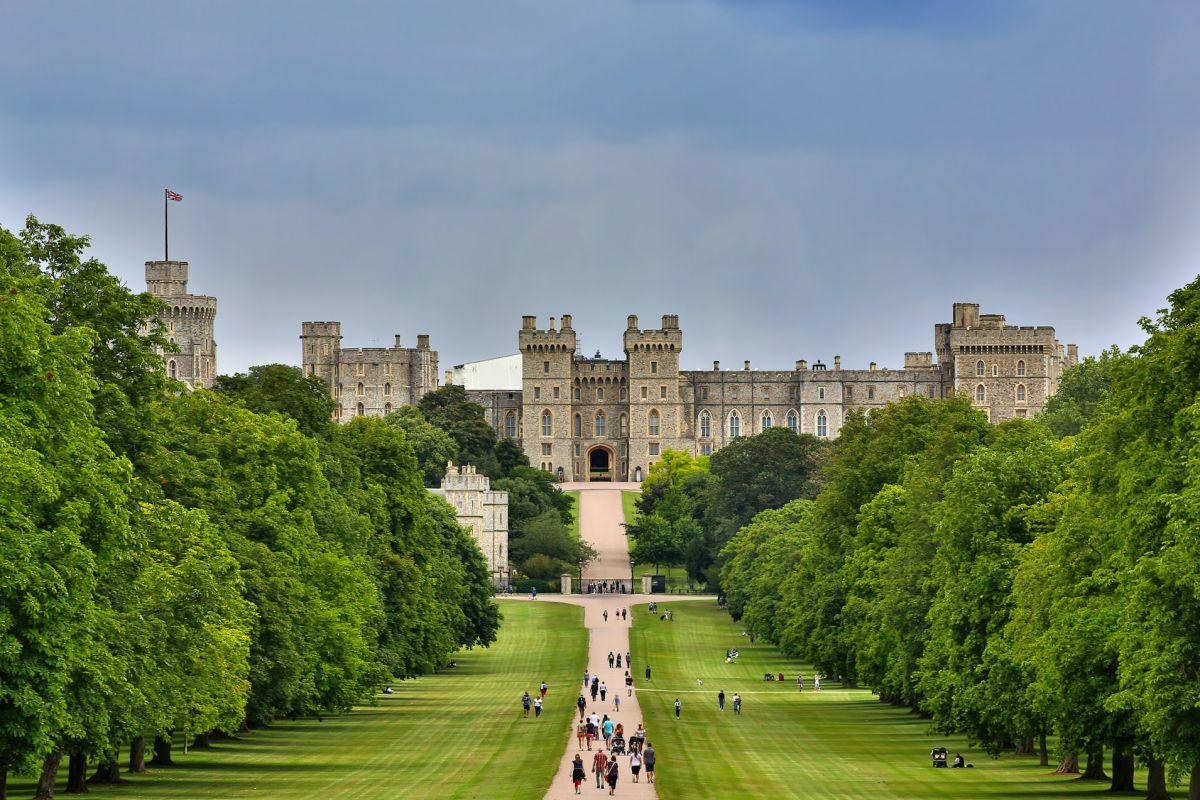
The castle was built under William the Conqueror during the 11th century in this specific place not only because of the easy and quick access to London but also because of the proximity of the royal forest where hunting parties could be organized.
Windsor Castle is still often used as an official residence when Queen Elizabeth II receives monarchs, presidents, state visits, or public figures from around the world.
10. Hadrian’s Wall
Located in northern England at a 2h30 drive from Edinburgh, Hadrian’s Wall is one of the most outstanding constructions of the Roman Times in Great Britain.
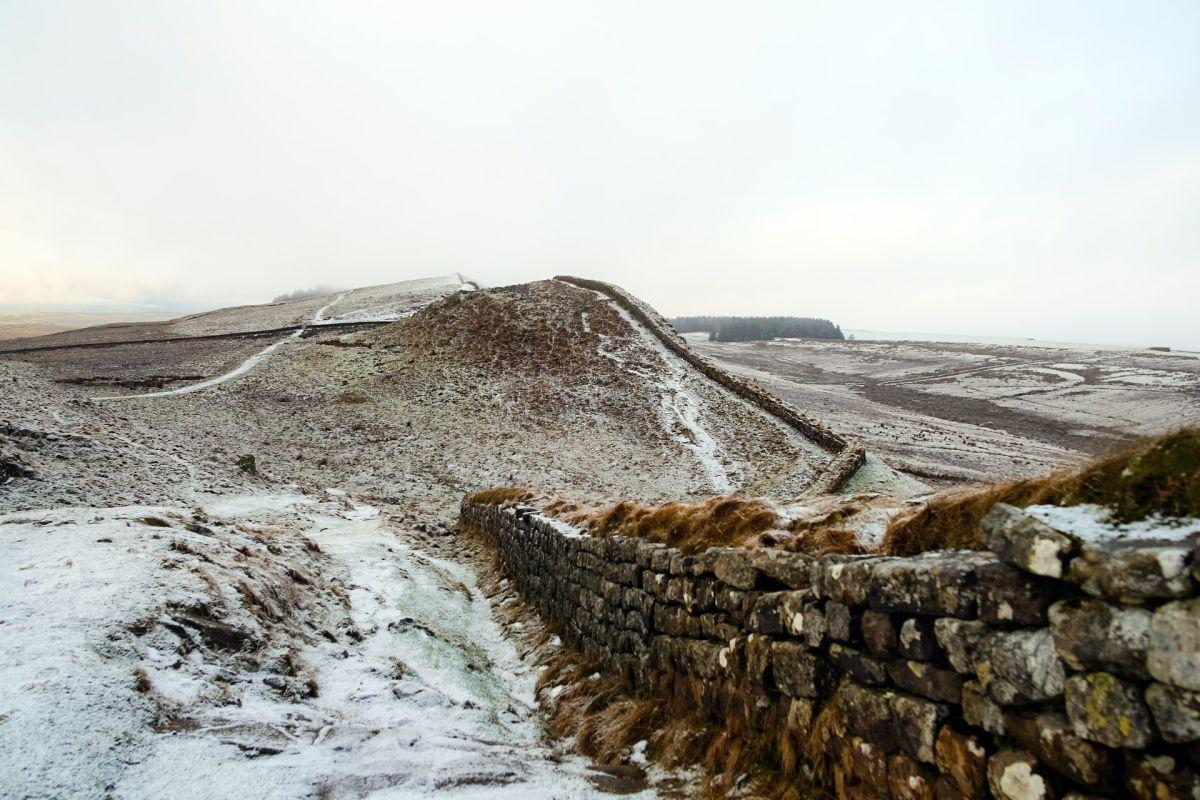
The wall was built in 122 AD to protect the country’s northwestern border from Scotland and expands continuously for 122 kilometers. The wall’s construction took about 200 years and the work of thousands of men! It’s quite exceptional that 2,000 years later, long parts of this wall are still intact.
Listed as a UNESCO World Heritage Site since 1987, Hadrian’s Wall has a museum dedicated to its history and Roman life at that time.
11. Royal Albert Dock Liverpool
The Royal Albert Dock is the best-known landmark and attraction in Liverpool. During the 19th century, it used to be the world’s most important harbor for maritime trade.
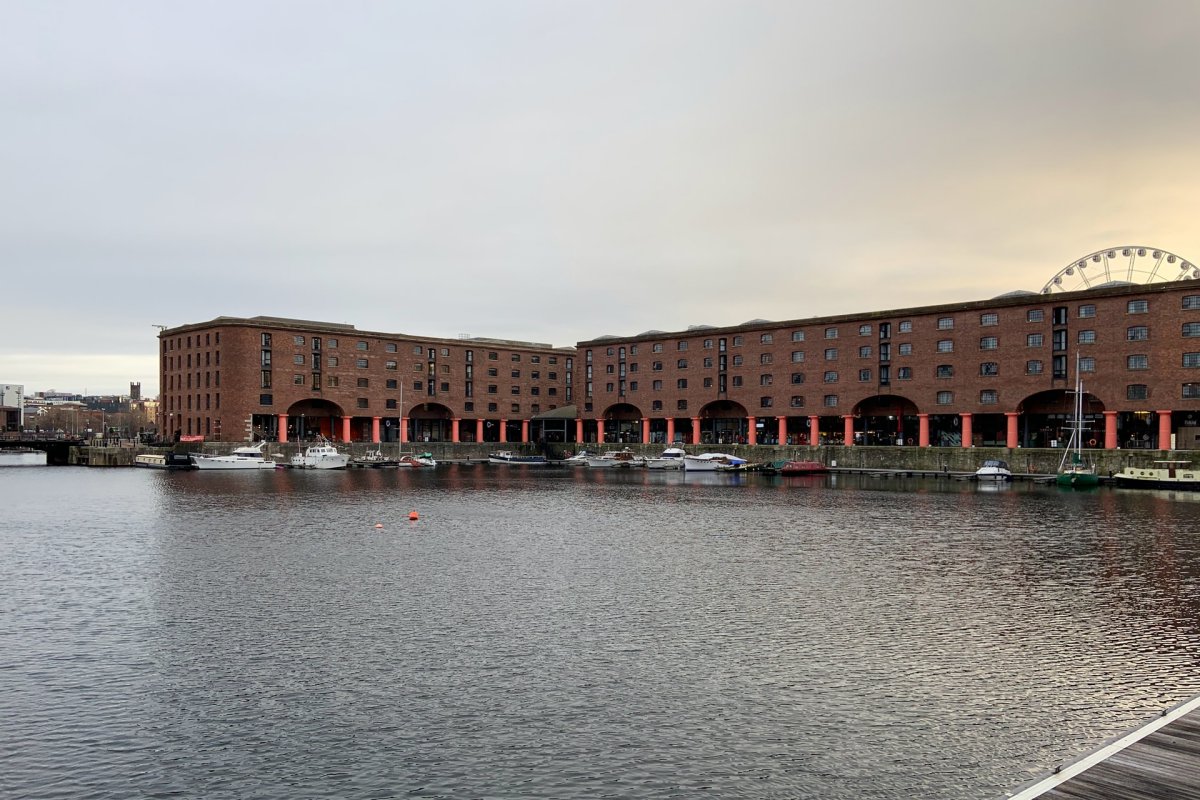
The history behind this harbor is quite dark, as it grew thanks to the slave trade. Due to the Slave Trade Act of 1807 that abolished slavery, the port had to change its activity and shift to people transport. While it had great success in the 19th century, the docks experienced a long period of decline until the 1990s when Liverpool city decided to conduct renovations.
Today, the Royal Albert Dock features restaurants, stores, galleries, and museums recalling the dock’s history. It has even been classified as a UNESCO World Heritage site in 2004.
Read more: Discover more landmarks in Liverpool
12. The Roman Baths
Located in the beautiful city of Bath (entirely classified as a UNESCO World Heritage Site), the Roman Baths are one of the most exceptional archaeological sites in the UK.
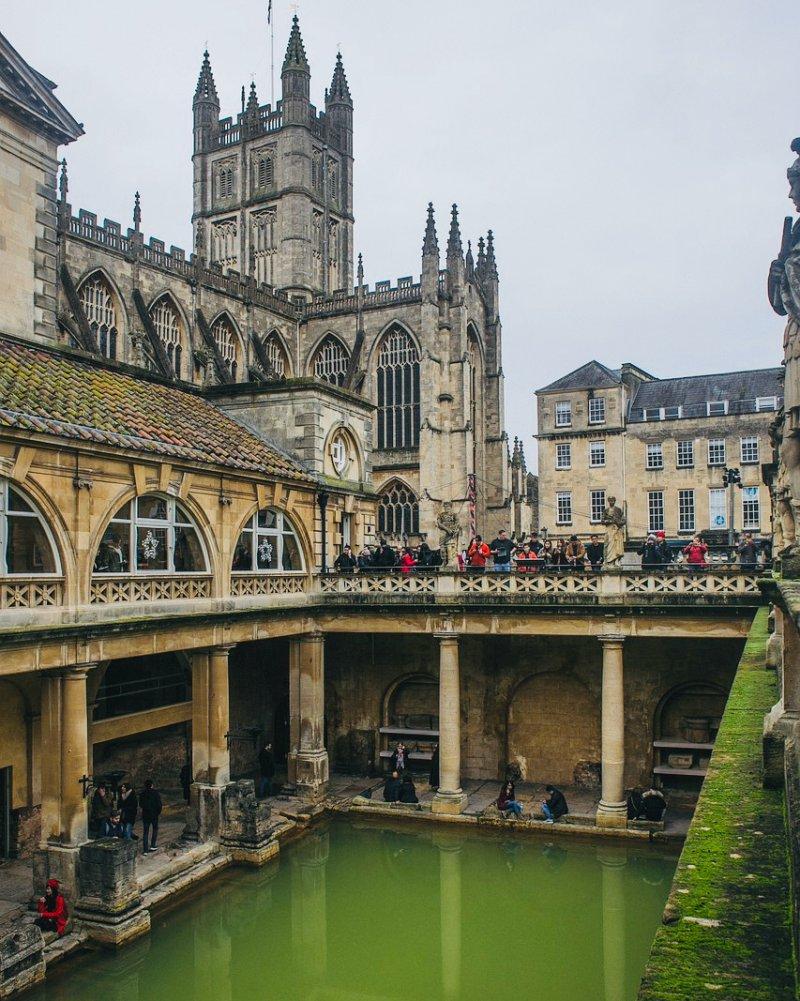
While the baths and temple were built during Roman times around 60-70 AD, the hot spring inside was known before the Romans as it was used by the Celts.
The baths are composed of 4 main parts: the baths, the hot spring, the Roman temple, and the museum showcasing archeological artifacts found on the site. Unfortunately, the baths are no longer accessible for bathing since the 1970s, but you can still try the hot spring in the Thermae Bath Spa.
13. Brighton Palace Pier
Located in southeast England in the city of Brighton, the Brighton Palace is an amusement park set on a 525-meter long pier jutting out into the sea.
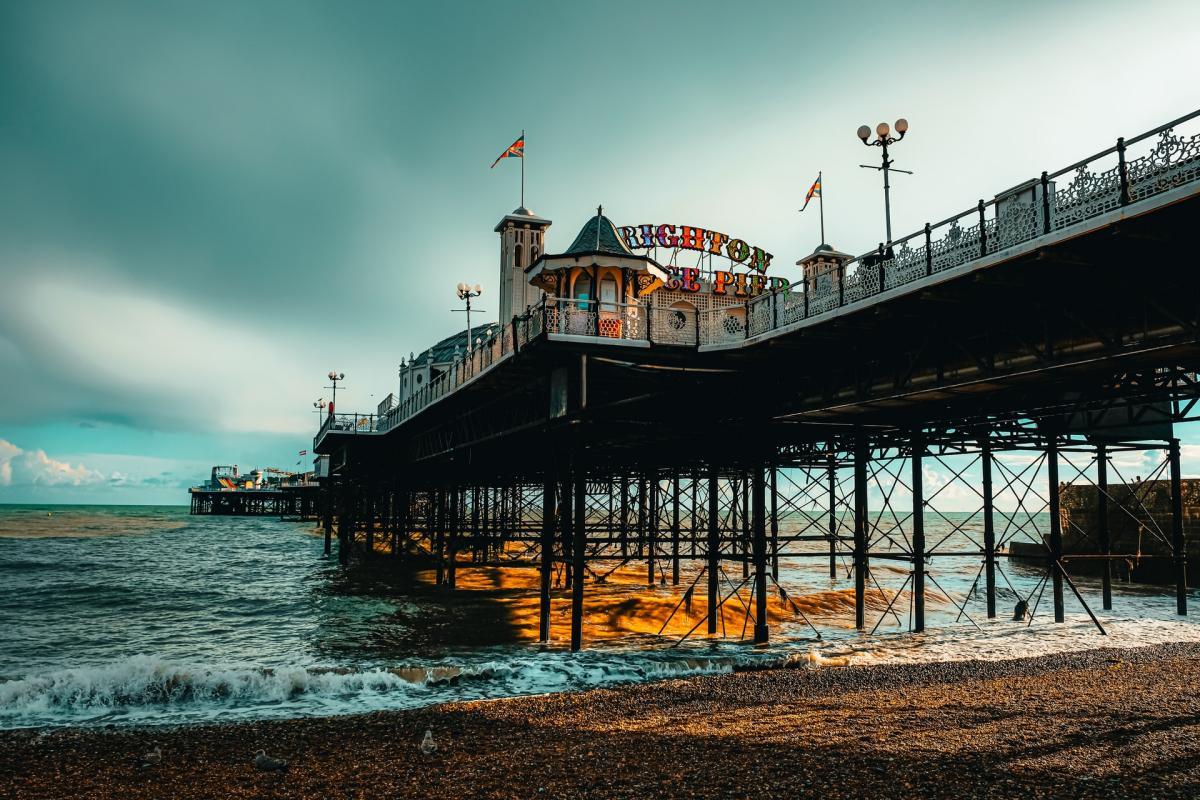
Opened at the end of the 19th century during the Victorian era, the wooden pier features a permanent funfair with bars, restaurants, and game rooms.
The very charming setting of the pier floating on the sea, along with the lively atmosphere of the place makes the Brighton Palace Pier one of the best attractions in the UK.
14. Cotswolds
The Cotswolds is a region of southwest England expanding over 150 kilometers and made of hills and pretty tiny historic villages. Going to the Cotswolds with kids is very popular with both locals and tourists.
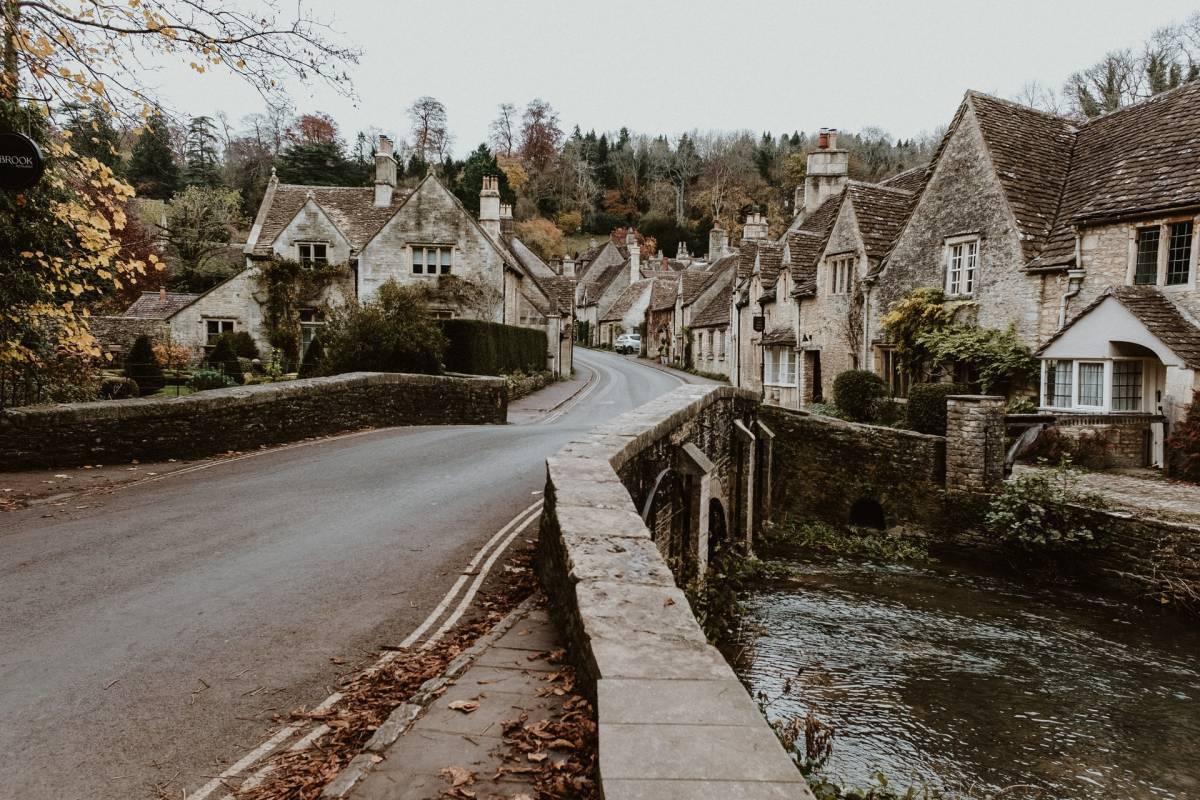
Everyone visiting the Cotswolds is surprised because it looks like frozen in the past. This is because the train couldn’t cross the area due to the relief full of hills. Therefore, the Cotswolds remained away from modernity and kept intact its pretty picturesque villages.
Going to the Cotswolds is experiencing the real English countryside, especially in the famous villages of Bibury, Castle Combe or Chipping Camden. Visitors love seeing the typical thatched roofs of the cottages, discovering the historical places, the cute cafés, and cool pubs.
15. Warwick Castle
Located close to the River Avon in the town of Warwick, this castle is among the best examples of the military architecture of the 14th century.
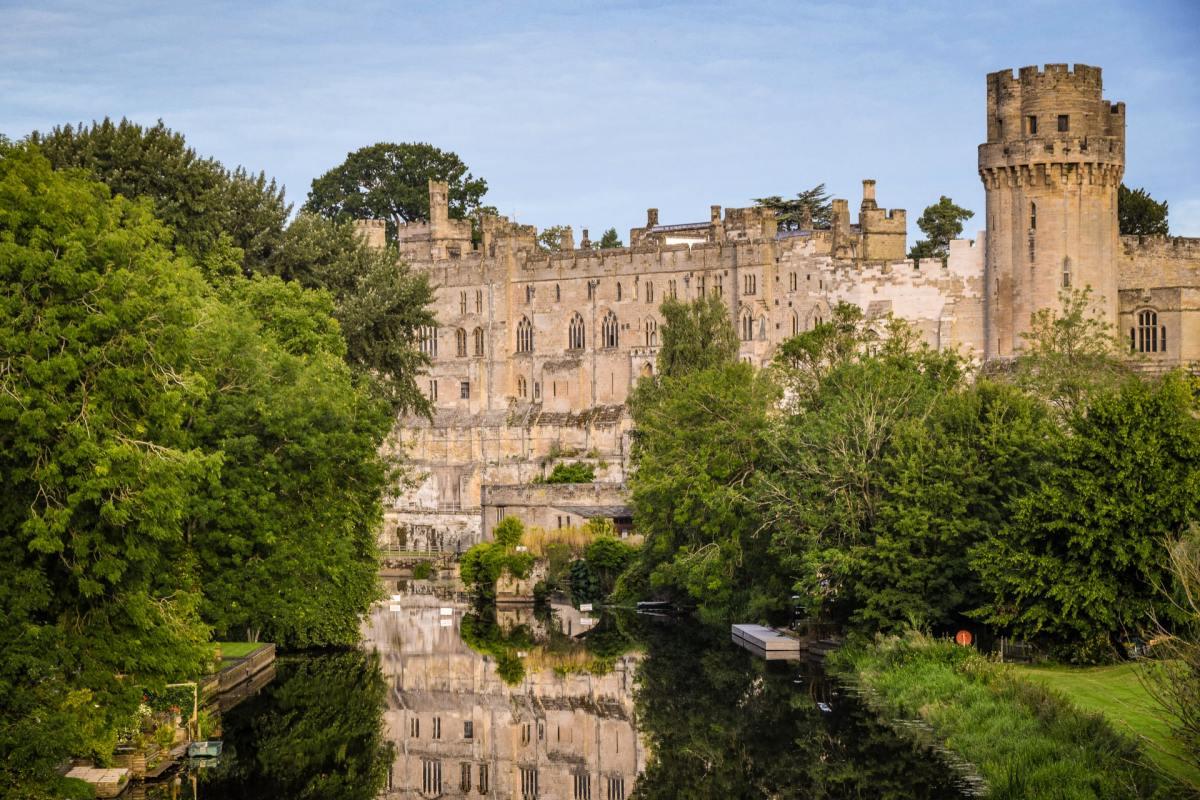
Like Windsor Castle, Warwick Castle was built in the 11th century under William the Conqueror, on the ruins of an ancient Saxion fort. Although the castle suffered many raids, fires, and ownership changes, it’s still standing today.
Warwick Castle offers wonderful views from its ramparts because of its location on the edge of a cliff. Visiting this castle is an absolutely recommended attraction as the tours provide comprehensive and fun explanations about the castle’s history and medieval life.
16. Clifton Suspension Bridge
Situated on the western part of Bristol, the Clifton Suspension Bridge is a chain bridge from the 19th century suspended 75 meters above the Avon River gorge.
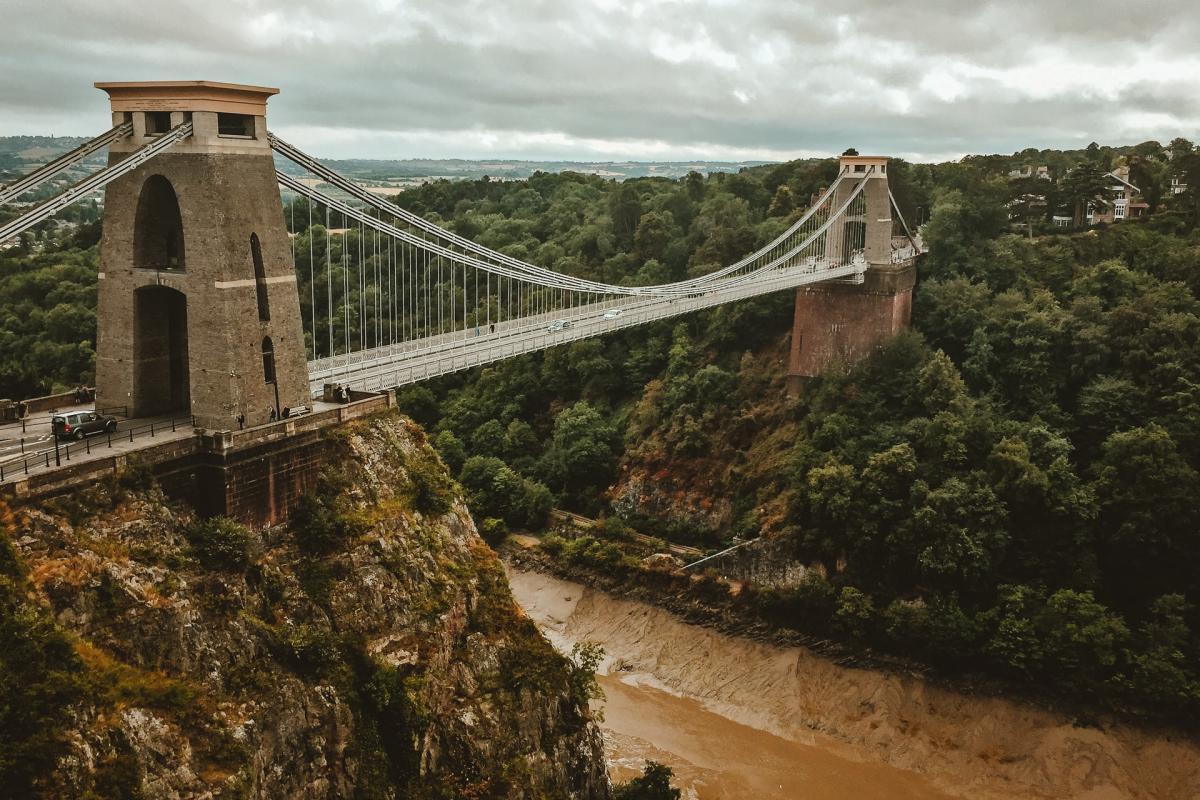
Connecting the Clifton district in Bristol to the city of Leigh Woods, the Clifton Suspension Bridge has become a must-see in Bristol. Visitors come to admire the bridge either from the Clifton Observatory to get a breathtaking view of it, or they can also cross it on foot to have a view over Bristol.
17. Caernarfon Castle
Caernarfon Castle is famous for being one of Europe’s largest medieval constructions. Situated in North Wales, this castle is a massive fortress and is a strong symbol of the British authority.
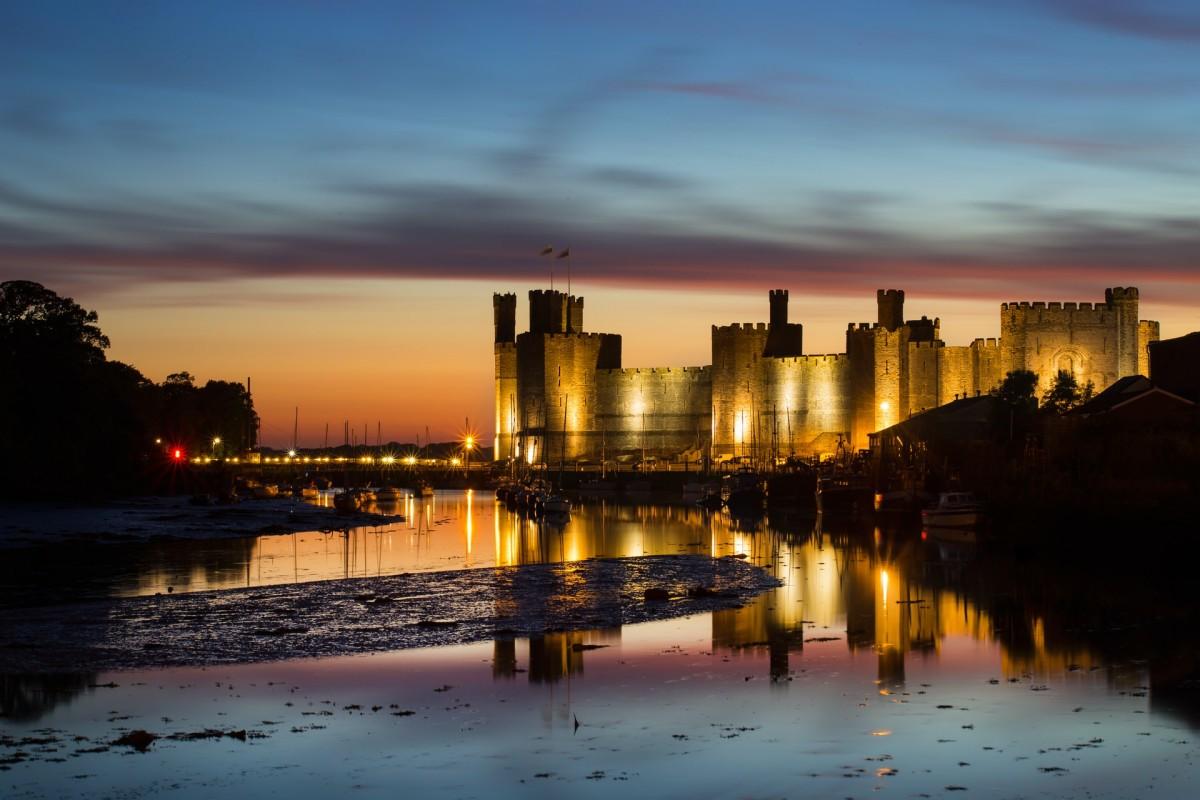
Built under King Edward I in the late 13th century after the conquest of Wales, Caernarfon Castle is marked by an eventful history. Indeed, the castle survived many sieges in the 15th century and the mid-17th century during the First English Civil War. Neglected until the 19th century, the government conducted reconstruction work to give it back its former glory.
Classified as a UNESCO World Heritage Site since 1986, Caernarfon Castle now features a museum inside its walls that helps visitors better understand its history.
18. Cardiff Castle
Located in the heart of Cardiff, this castle is definitely the attraction that makes the city’s fame throughout the UK and the world.
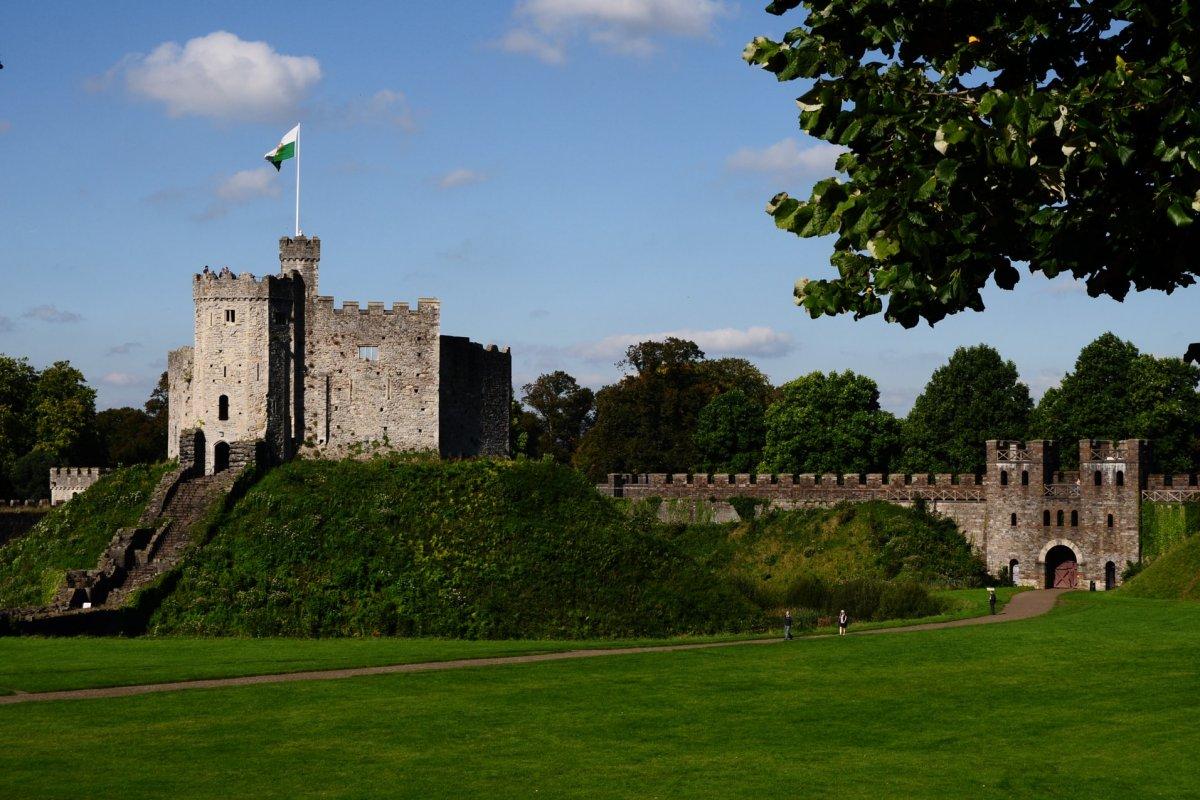
Cardiff Castle is actually composed of 3 fortresses from different times. Built on the site of an old Roman fort, some parts have been kept and others have been restored. Later, 2 additions have been made: first the Norman Castle in 1090, and the 19th century, the Victorian Palace.
Because the castle’s main tower, the Norman Keep, offers a stunning view of the city, climbing it became a must-do in Cardiff. Visitors also particularly love discovering the Castle Hose and the Clock Tower Tours.
Read more: Discover more landmarks in Cardiff, UK
19. St David’s Cathedral
This cathedral, situated in the county of Pembrokeshire, is known to be one of the oldest and largest cathedrals in the UK.
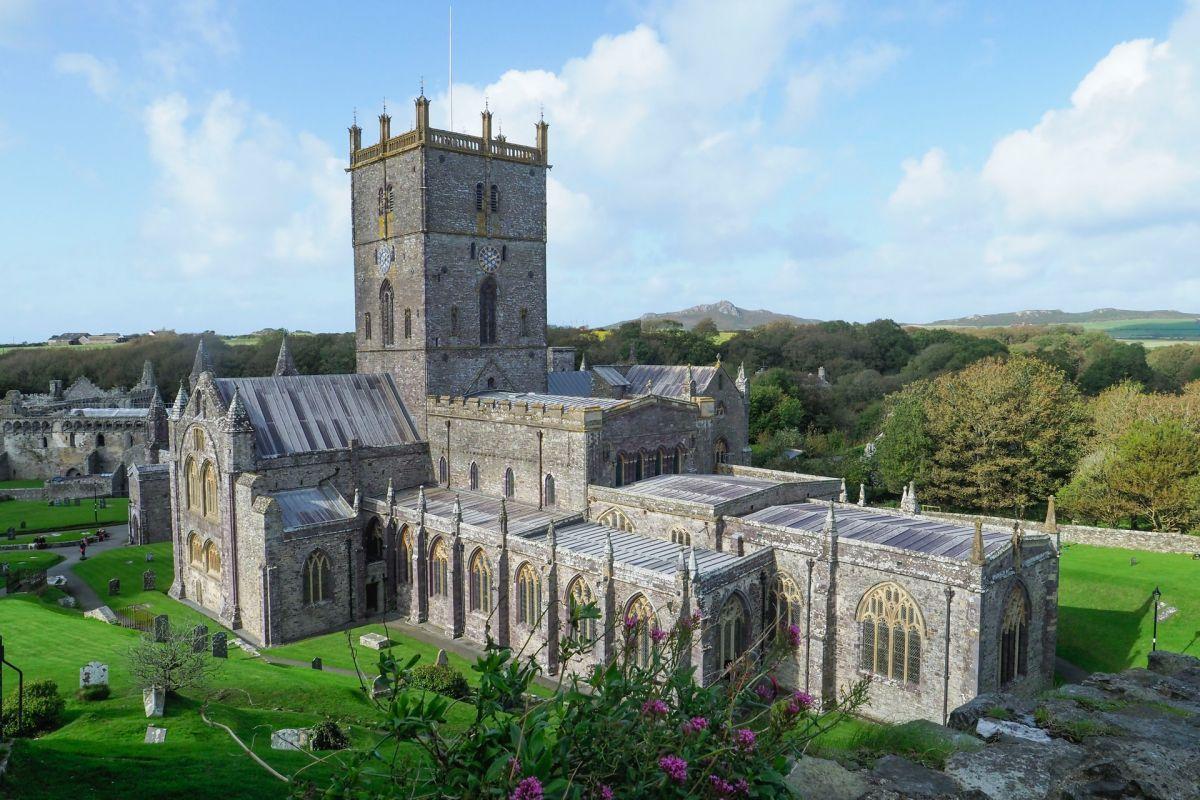
St David’s Cathedral was built between the 12th and the 13th century on the site of former cathedrals destroyed by Viking invasions. Several additions and modifications have been made to the cathedral in the course of history, especially in the 14th and 16th centuries. Recently, some restoration work has been made to protect it from deterioration.
St David’s Cathedral has some exceptional features, including its outside facade color which is a mix of pink and grey, its typical Anglican square tower, the 16th-century oak ceiling inside, and of course St David’s burial and relics.
20. Edinburgh Castle
Edinburgh Castle is arguably the most famous monument in all Scotland. Situated on the Royal Mile in the old town, the castle can be seen by far as it sits on Castle Rock’s steep hills.
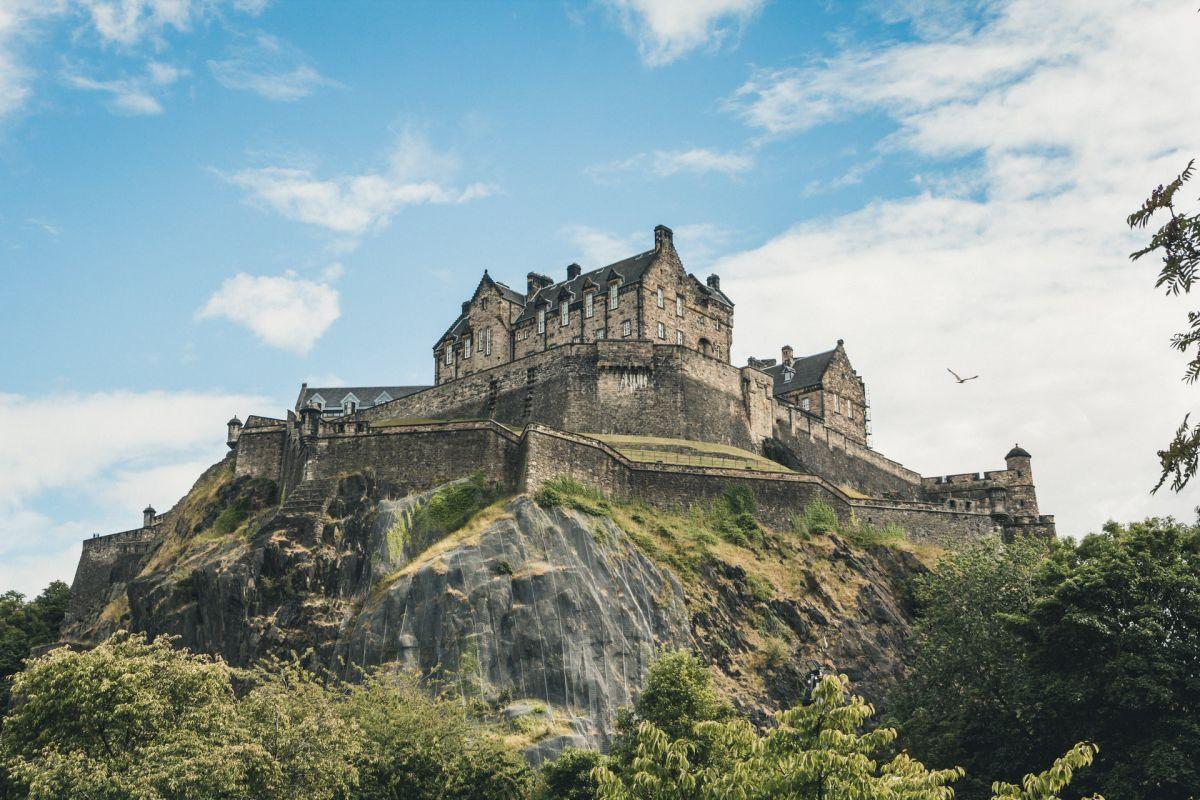
Founded in the 12th century, the castle is a remnant of the painful history between England and Scotland. It was used as a military base and royal residence for many Scottish sovereigns, including the most famous of them, Mary Stuart.
The museum inside tells the story of the castle and displays beautiful royal objects such as the crown jewels. The castle exteriors are also very pretty, but the best is for sure the panoramic view of Edinburgh’s old town from the ramparts.
21. Balmoral Castle
Since Queen Victoria, Balmoral Castle serves as the summer residence of the royal family in the Highlands.
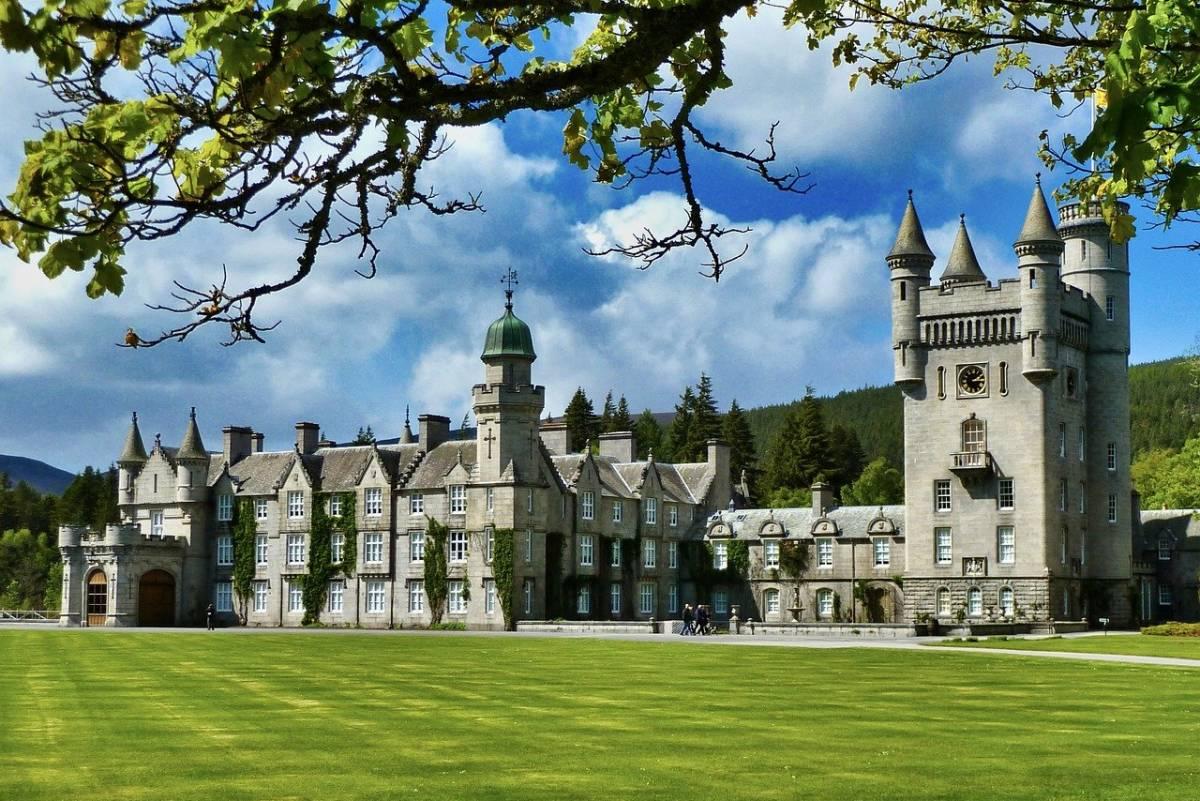
After spending a vacation there, Queen Victoria fell in love with it and decided to purchase it in 1852. But considered too small for the royal family’s needs, the crown and Prince Albert decided to build a new castle nearby in 1856. Balmoral Castle is Queen Elizabeth II’s favorite home and every year, she spends the summer holidays there.
The castle’s ground, gardens, and ballroom are accessible to the public when the royal family isn’t staying in. Unfortunately, the rest of the castle isn’t open to the public.
22. Glenfinnan Viaduct
Rising at 30 meters above the ground in eastern Scotland, the Glenfinnan Viaduct is a construction from the 20th century connecting the cities of Fort William and Mallaig.
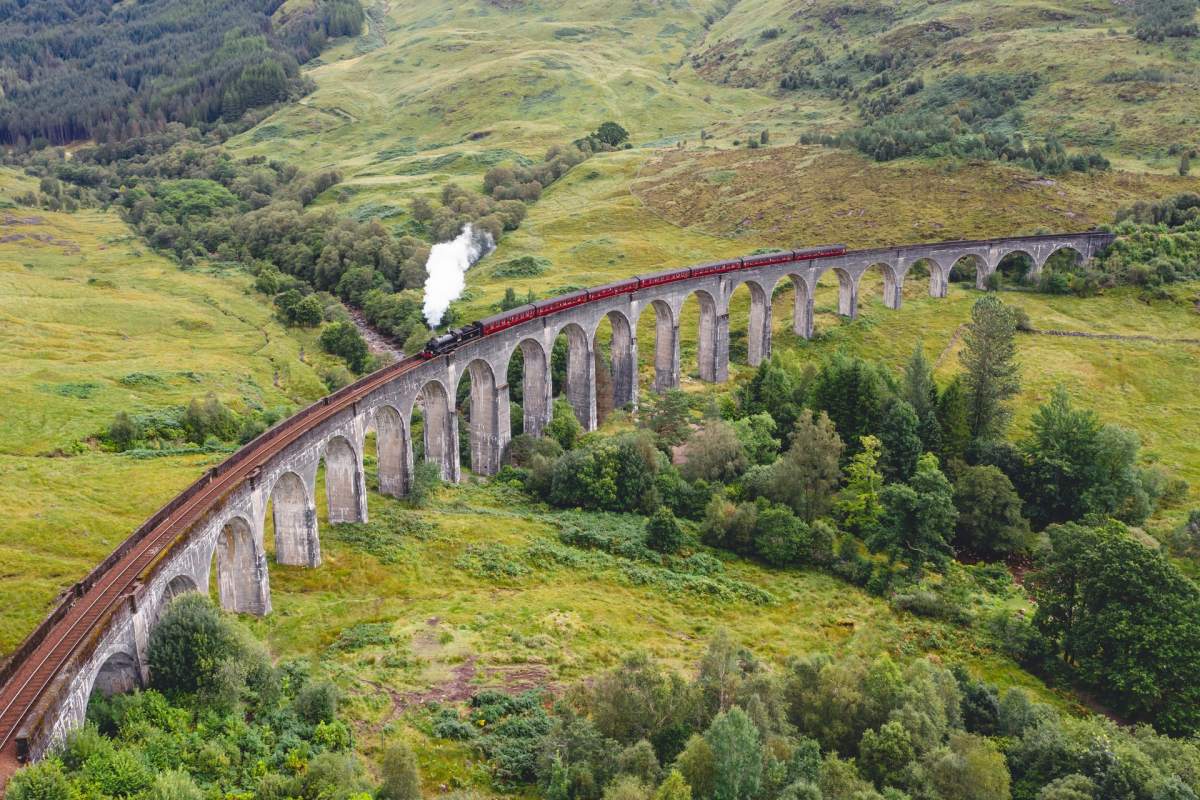
The viaduct is worldwide famous for having inspired J.K Rowling for Harry Potter’s Hogwarts Express and is now one of the most visited spots in Scotland.
People can go to the official viewpoint to watch the Jacobite Express every day in spring and summer. To get a closer look at the train and the viaduct, prefer to go to the Glenfinnan Train Museum. From there, you can take a 45min path offering stunning views of the viaduct.
23. Stirling Castle
Settled in the city of Stirling located about 50 kilometers north of Glasgow, Stirling Castle is one of the biggest and prettiest castles of Scotland.
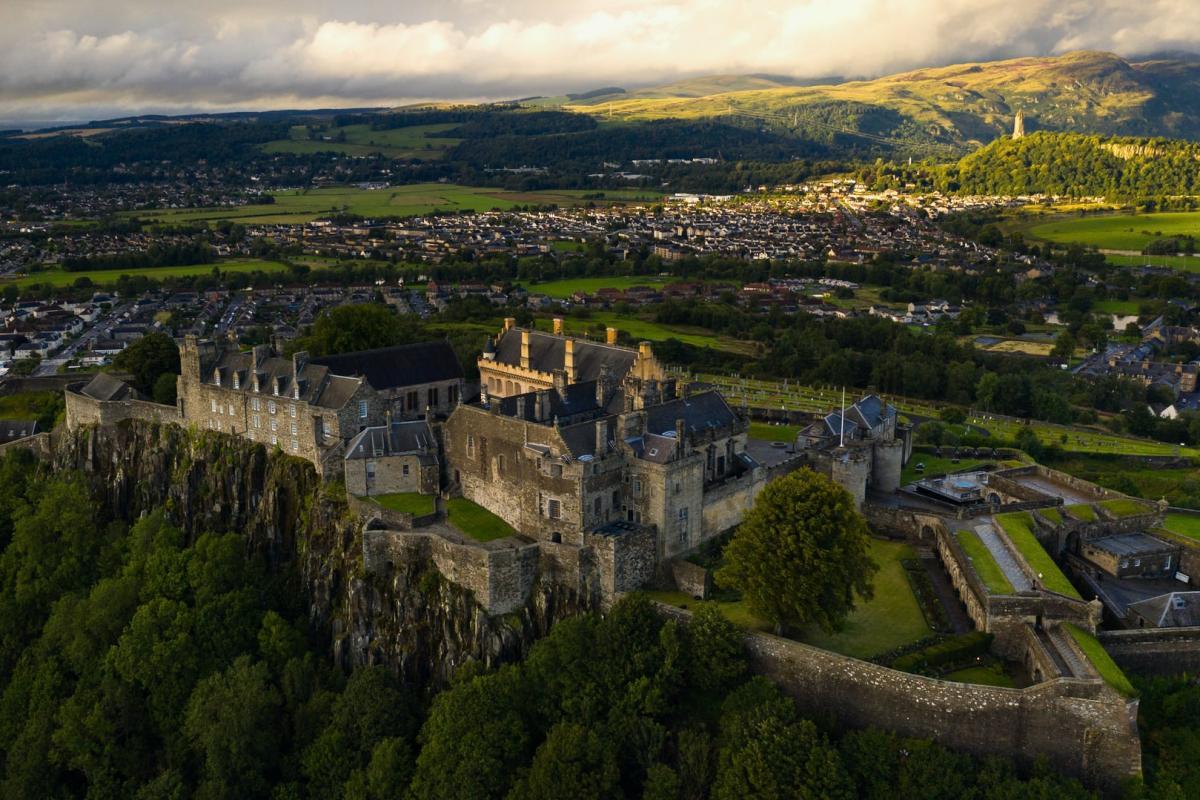
The origins of Stirling Castle stretch back to the 12th century when King Alexander I founded a chapel there. After King Alexander III died in 1286, the fortress kept switching from Scottish to English hands because of the wars of independence and succession. The Stuarts finally put an end to the wars and transformed the castle into a wonderful palace during the Renaissance.
Visiting Stirling Castle is a great experience you can’t miss when traveling to Scotland. The castle’s dimensions, decor, and history will certainly delight you.
24. Dunluce Castle
Located about 1h15 from Belfast, Dunluce Castle is one of the most famous and visited spots in Northern Ireland.
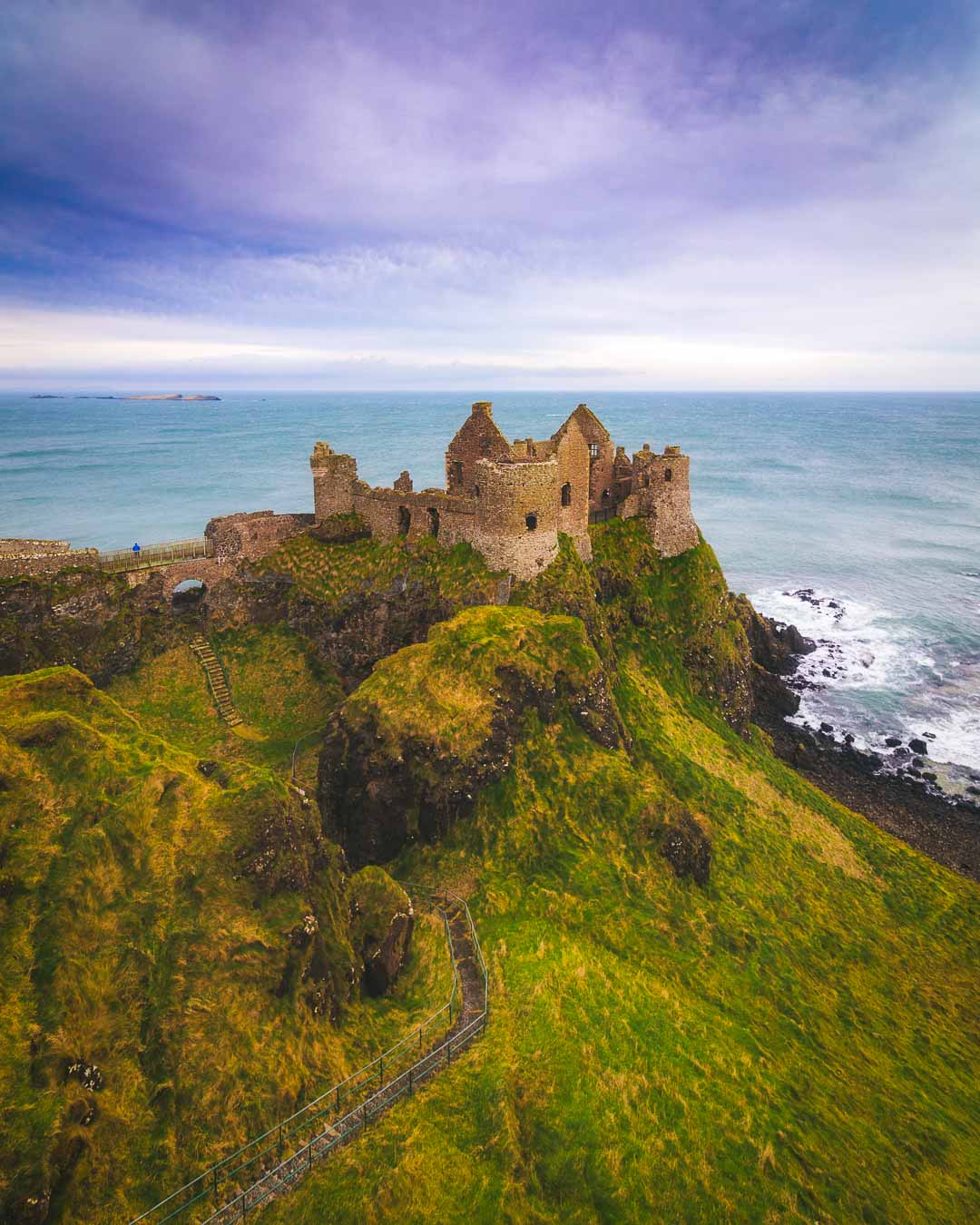
Dunluce Castle used to be the home of the MacDonell clan, a noble family from Scotland in the 17th century. It was already known for housing treasures from all over Europe and its rich decorations.
Thanks to its position on the edge of a cliff, Dunluce Castle survived 7 sieges before being strongly damaged by storms in 1639. The castle was therefore abandoned and that’s why only ruins are remaining today. What’s left of it threatens to collapse into the sea every day.
Read more: Discover more about Dunluce Castle
25. The Peace Bridge
Also located in Northern Ireland in the town of Derry/Londonderry, the Peace Bridge is an s-shaped bridge measuring 312 meters long over the River Foyle.
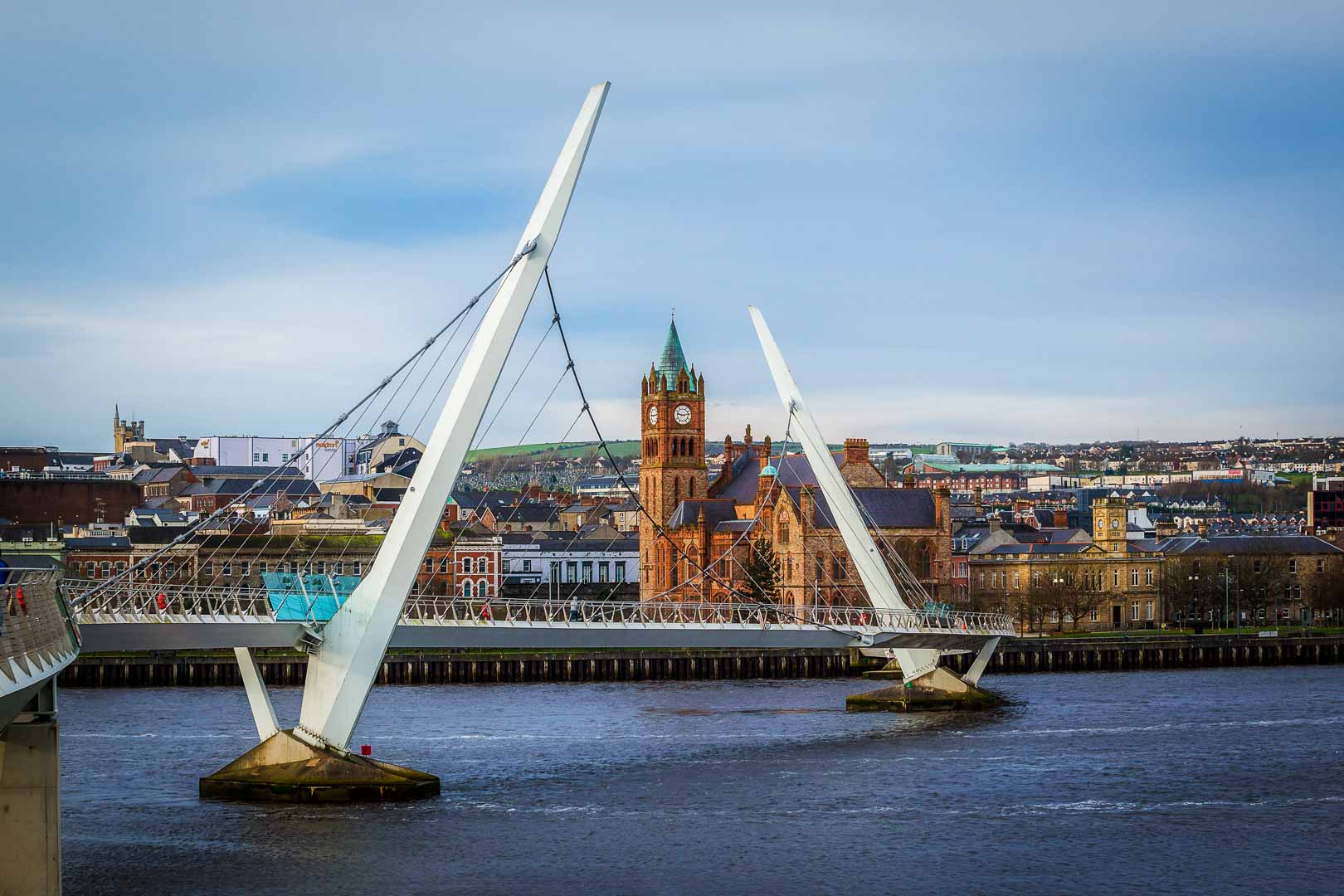
The city is sadly famous for the conflicts between the Protestants supporting the British crown, and the Catholics claiming to belong to Ireland. The Peace Bridge, completed in 2011, was built to connect the Catholic part of the city (west bank) to the Protestant part (east bank) and bridge the gap between the 2 communities.
Although recent, the Peace Bridge quickly became the symbol of the city. You’ve certainly already seen this famous photo of the bridge with the Guildhall standing in between the 2 white pillars.
Famous Natural Landmarks in the UK
With around 12,429 kilometers of coastline, there’s no doubt the UK offers wonderful landscapes, beaches, and more.
Here are 15 of the best natural landmarks of the United Kingdom.
26. Seven Sister
Stretching along the English Channel, the Seven Sisters are chalk cliffs located only 2 hours drive from London. It’s a part of the famous White Cliffs of Dover and it’s a very popular weekend getaway for Londoners.
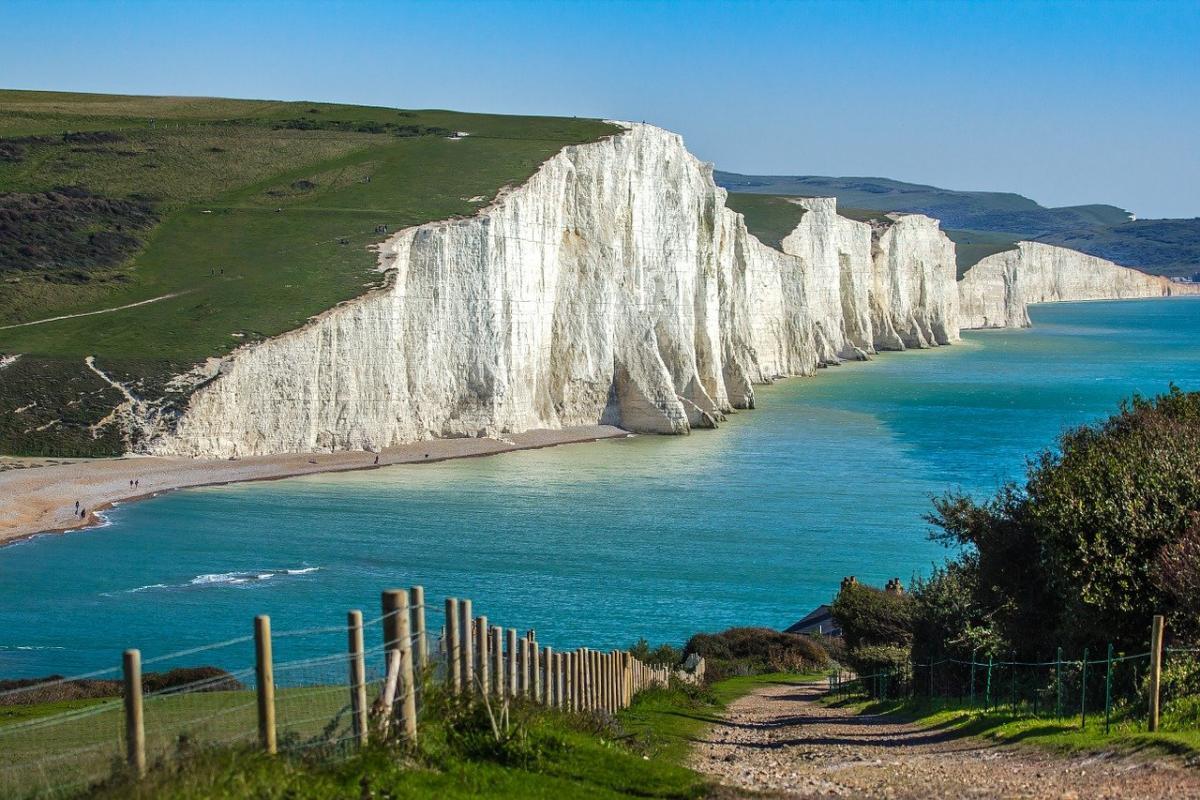
Very similar to the famous Etretat cliffs on the other side of the sea in France, the Seven Sisters cliffs feature 8 hills and peaks and extend over 21 kilometers of coastline.
The best way to discover the Seven Sisters is to take the South Downs Way. This 160 kilometer-long hike between the towns of Winchester and Eastbourne offers the best views on the chalk cliffs.
27. Stonehenge
Stonehenge is one of the finest prehistoric sites in England. Located 2 hours drive from London, Stonehenge is classified as a UNESCO Heritage Site since 1986, and millions of people visit it every year.
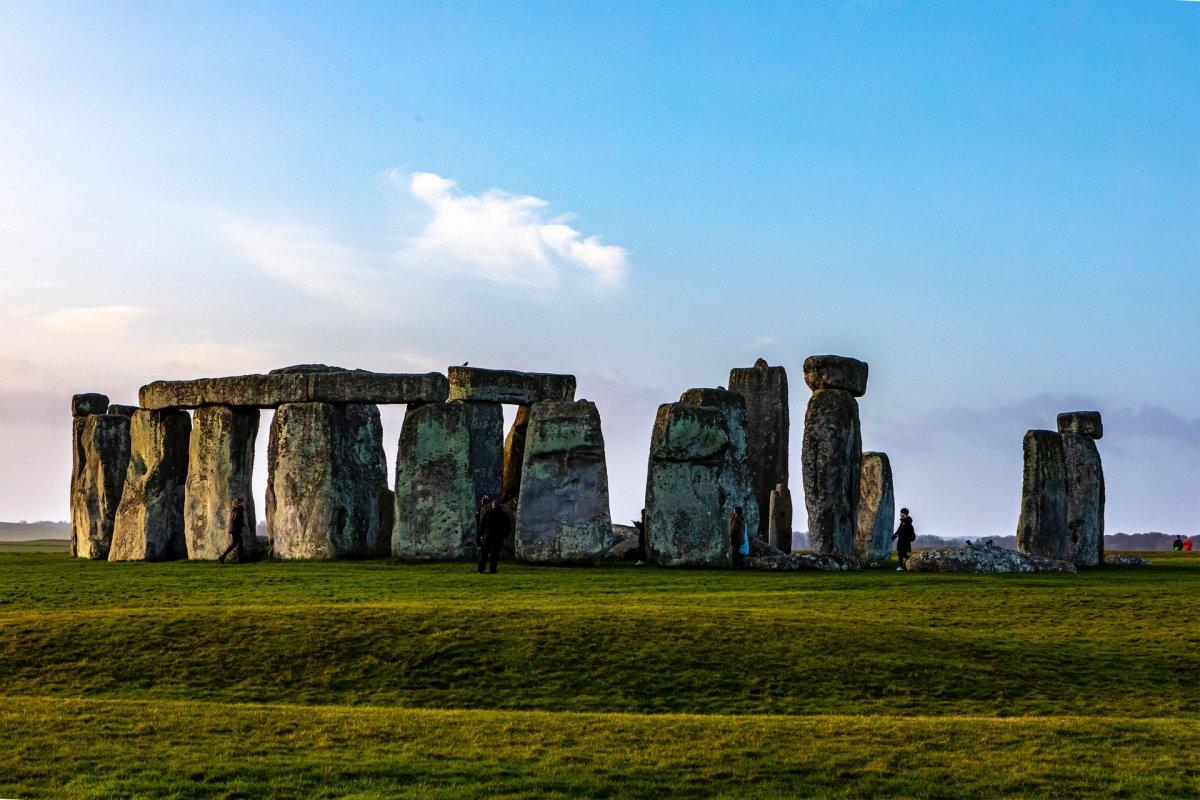
Stonehenge is made of 460 stones forming Europe’s largest circle of dolmens. Composed of stones of all sizes and weighing a few tons each, Stonehenge has a special atmosphere that makes the place unforgettable for any visitor.
The site is said to date back to 2500 BC, but researchers couldn’t show its origin or purpose in spite of the several excavations conducted there. But among the theories, the most likely is that it was an astronomical site that was used to read time and identify seasons.
28. Jurassic Coast
The Jurassic Coast is a stretch of coastline in the south of England that is a UNESCO World Heritage Site. It is 150 kilometers long and starts at Exmouth in East Devon and ends at Old Harry Rocks in Dorset.
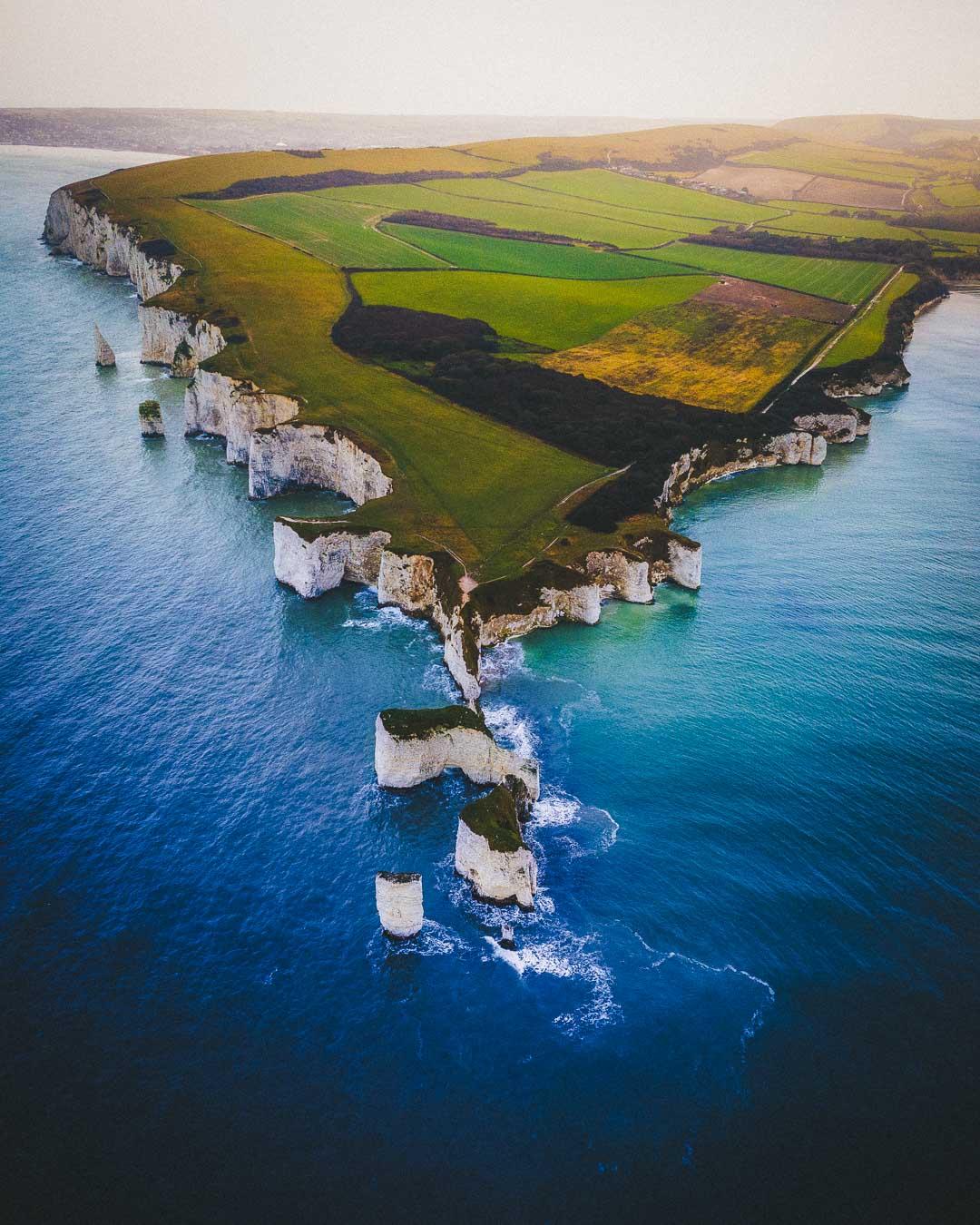
This part of the Dorset coast is called the Jurassic Coast because of its amazing geology and fossils. Indeed, the cliffs and beaches of this region date back to the dinosaur period and are full of fossils. Looking at the Jurassic Coast from the sea, you can see the different layers of stone dating back 185 million years! Some sites are exceptional, such as Durdle Door or Lulworth Cove.
But apart from its unique coastline, Dorset is also home to charming villages with quaint cottages, cute cafes and castles such as Corfe Castle.
Read more: Travel Guide to the Jurassic Coast
29. St Michael’s Mount
St Michael’s Mount is a tiny island topped by a fortress situated hundreds of meters from England’s southwestern tip in the Celtic sea.
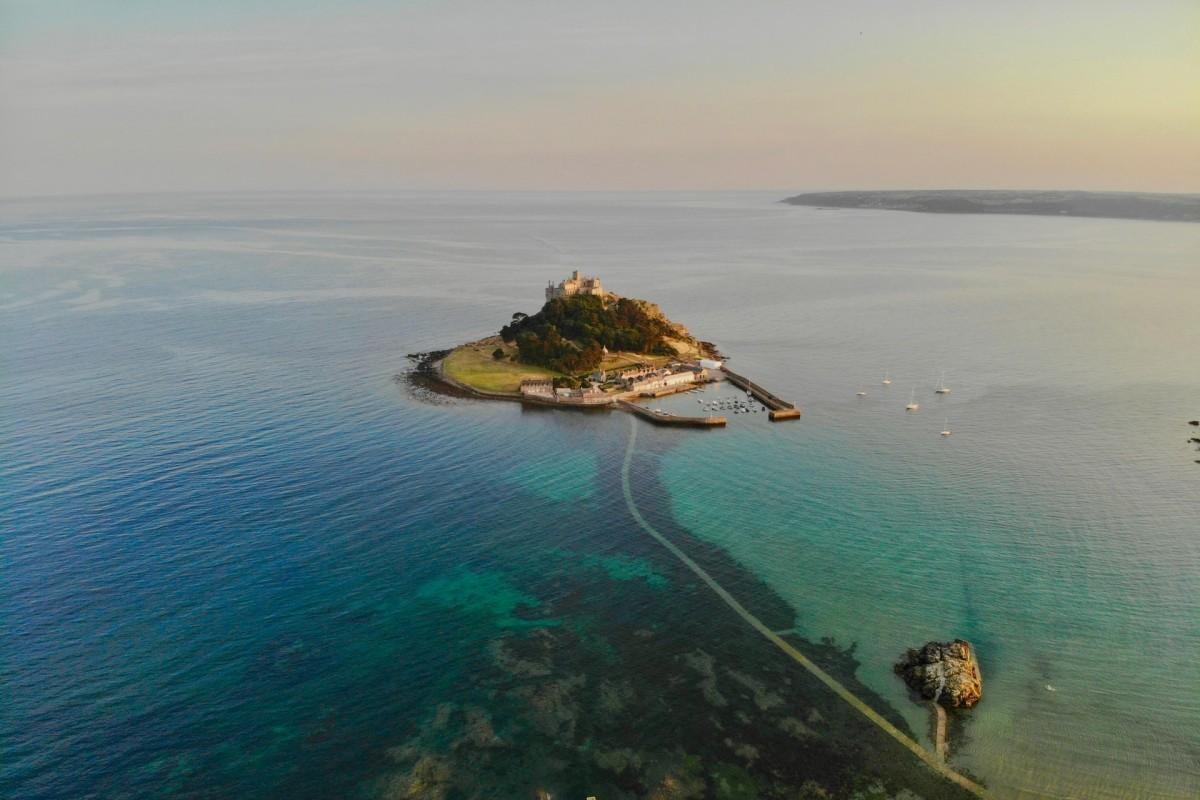
The story tells that a Celtic monastery settled on the island in the 8th century and became a pilgrimage site. King Edward the Confessor then donated St Michael’s Mount to the Abbey of Mont-St-Michel in France to build a Benedictine monastery. King Henry VIII then dissolved the monastery accordingly with the English Reformation, and Colonel John St Aubyn purchased it in 1647.
The place is has something magical. When the tide goes out, a road appears in the middle of the sea allowing access to the island. The 60-meter high island is now home to a small fishing port, a chapel dedicated to Saint Michael, and a sumptuous castle surrounded by terraced gardens.
30. Peak District National Park
Located about 1 hour from Manchester in England, the Peak District is the oldest national park in Britain.
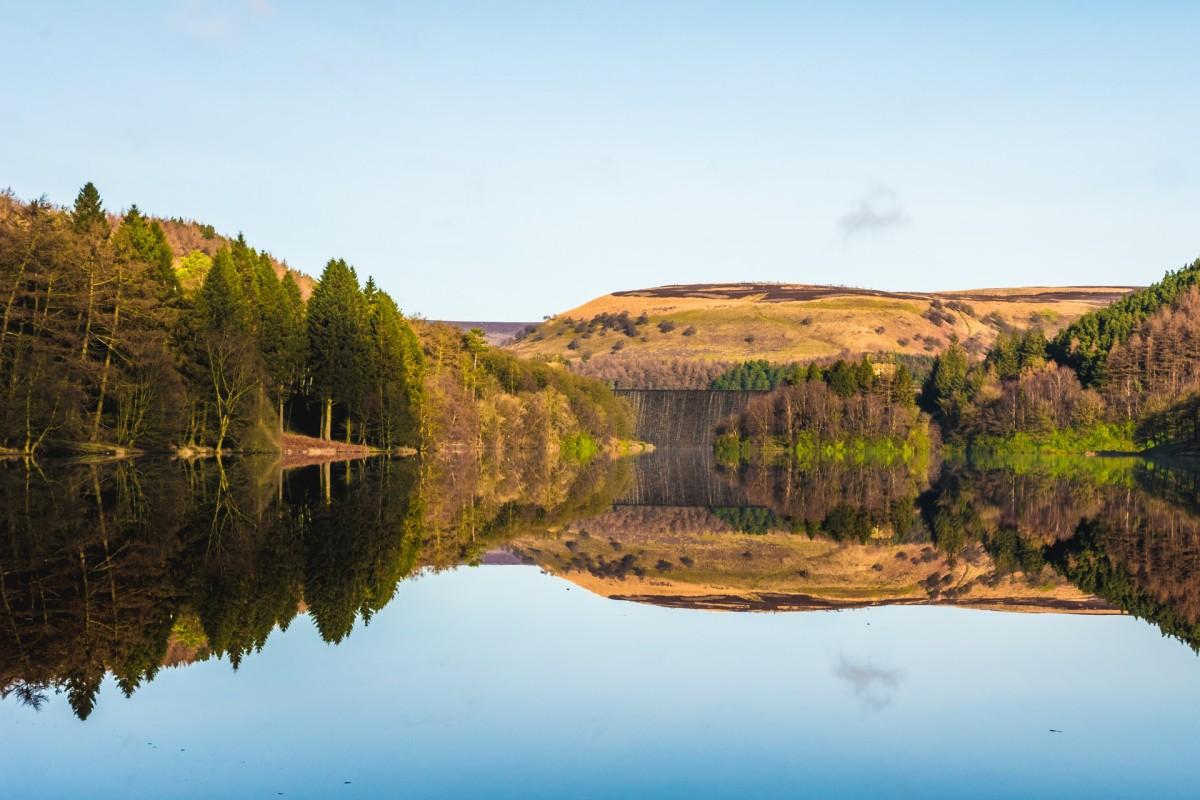
The Peak District National Park includes a mid-mountain region full of hills, gorges, and valleys and attracts thousands of visitors coming to enjoy outdoor activities here.
The park offers a plethora of things to do for any kind of visitor. From thermal towns such as Buxton and picturesque villages to hiking trails and heritage sites, it’s impossible to get bored in Peak District!
31. Glastonbury Tor
Situated close to Bath and Bristol in Somerset, Glastonbury Tor is a landmark you can see by far. It’s a hill topped with a huge tower, St. Michael’s Tower.
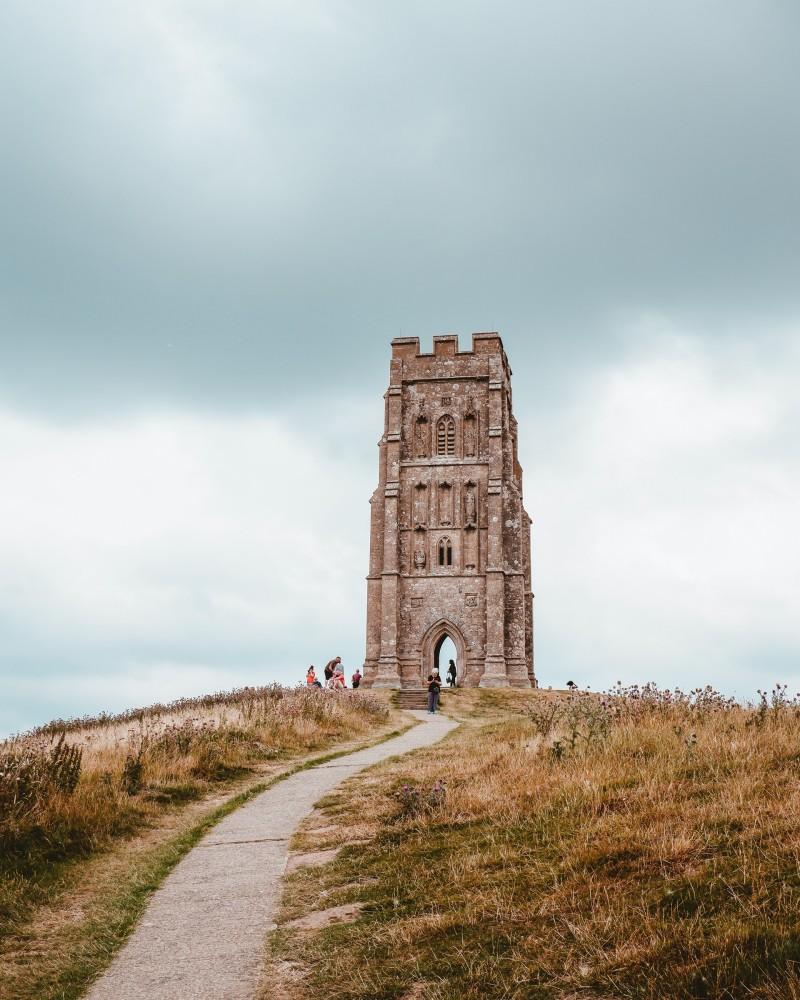
Glastonbury is remarkable by its shape, naturally conical, and made of limestone and clay with a hard sandstone top. St Michael’s Tower is in fact the ruins of a church from the 14th century that was left abandoned in 1539 because of the monasteries’ dissolution.
Glastonbury Tor rises to 158 meters and as a historical monument, attracts lots of visitors intrigued by the legends and stories surrounding the site.
32. The Dark Hedges
Located in Northern Ireland not far from Derry, the Dark Hedges grew popular because of Game of Thrones, as it’s one of the show’s filming locations.
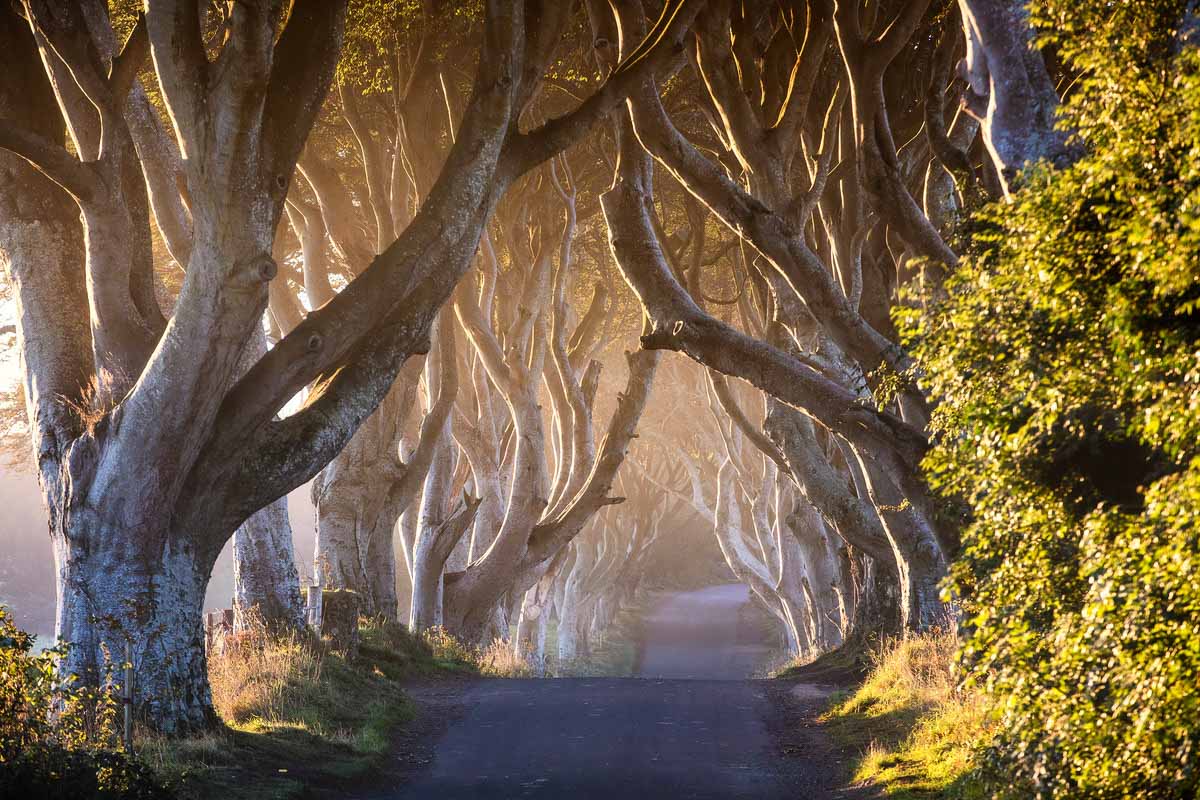
The Dark Hedges is a road lined with massive beech trees forming a tunnel up to Gracehill House, the Stuart family’s manor house. The place has a particular atmosphere as a legendary ghost is supposedly wandering along the road when there’s fog.
The place is now one of the most visited and photographed spots in the country, and it can be difficult to take a nice shot because of the crowds.
Read more: Discover more about the Dark Hedges
33. Giant’s Causeway
Located only a 20min drive from the Dark Hedges, Giant’s Causeway is the most famous landmark in Northern Ireland, for good reason.
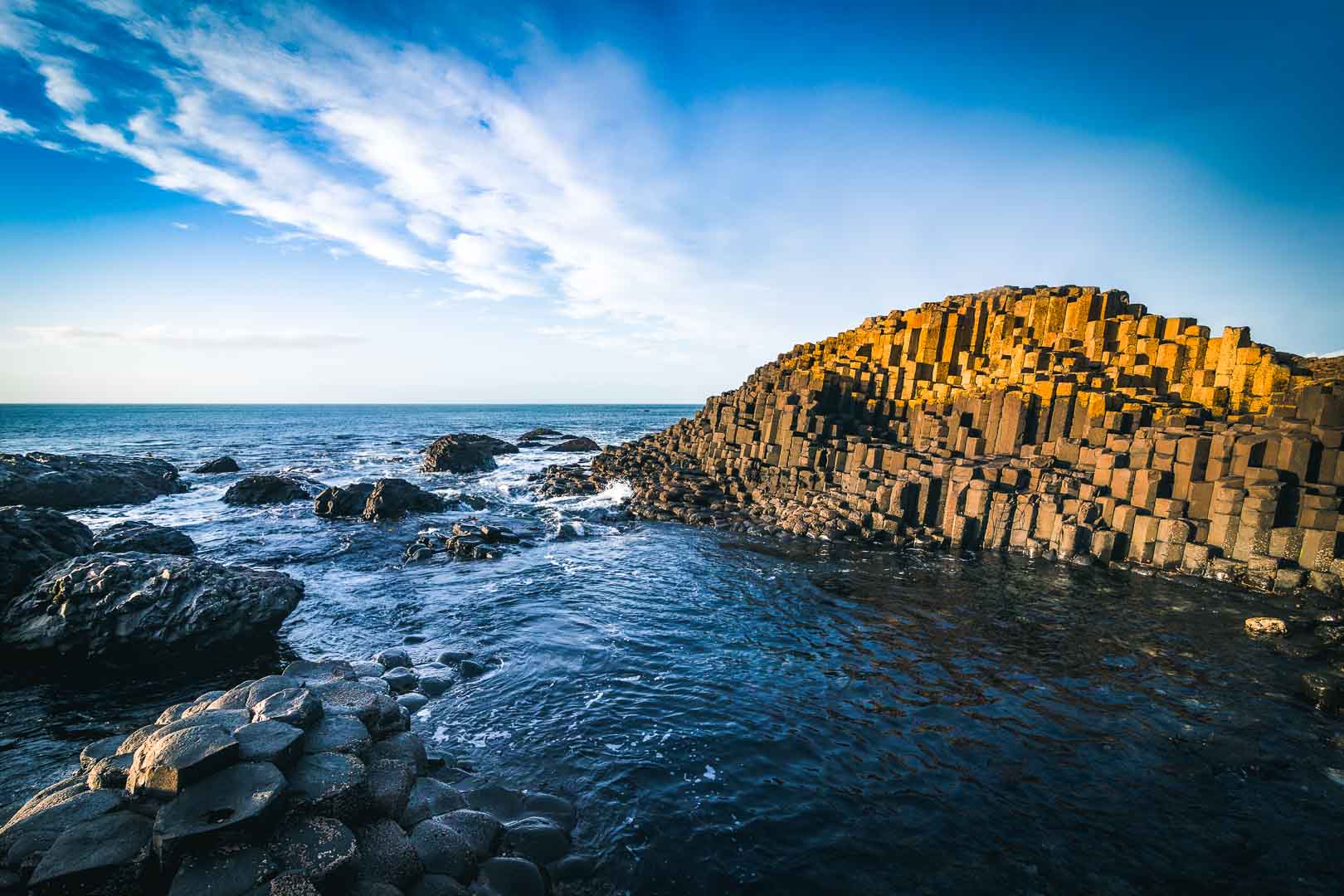
This natural wonder is the result of a lava explosion that happened more than 50 million years ago. It created these exceptional hexagonal basaltic columns that are said to be 40,000. Watching the waves crashing on it is a wonderful show to see.
Visitors can have fun walking on the columns or taking one of the hiking trails around to see the Giant’s Causeway from all angles.
Read more: Discover the Giant’s Causeway
34. Carrick-a-Rede
Also close to the Dark Hedges and Giant’s Causeway, Carrick-a-Rede is another wonder of Northern Ireland. It’s a famous attraction among tourists in need of adrenaline and challenges!
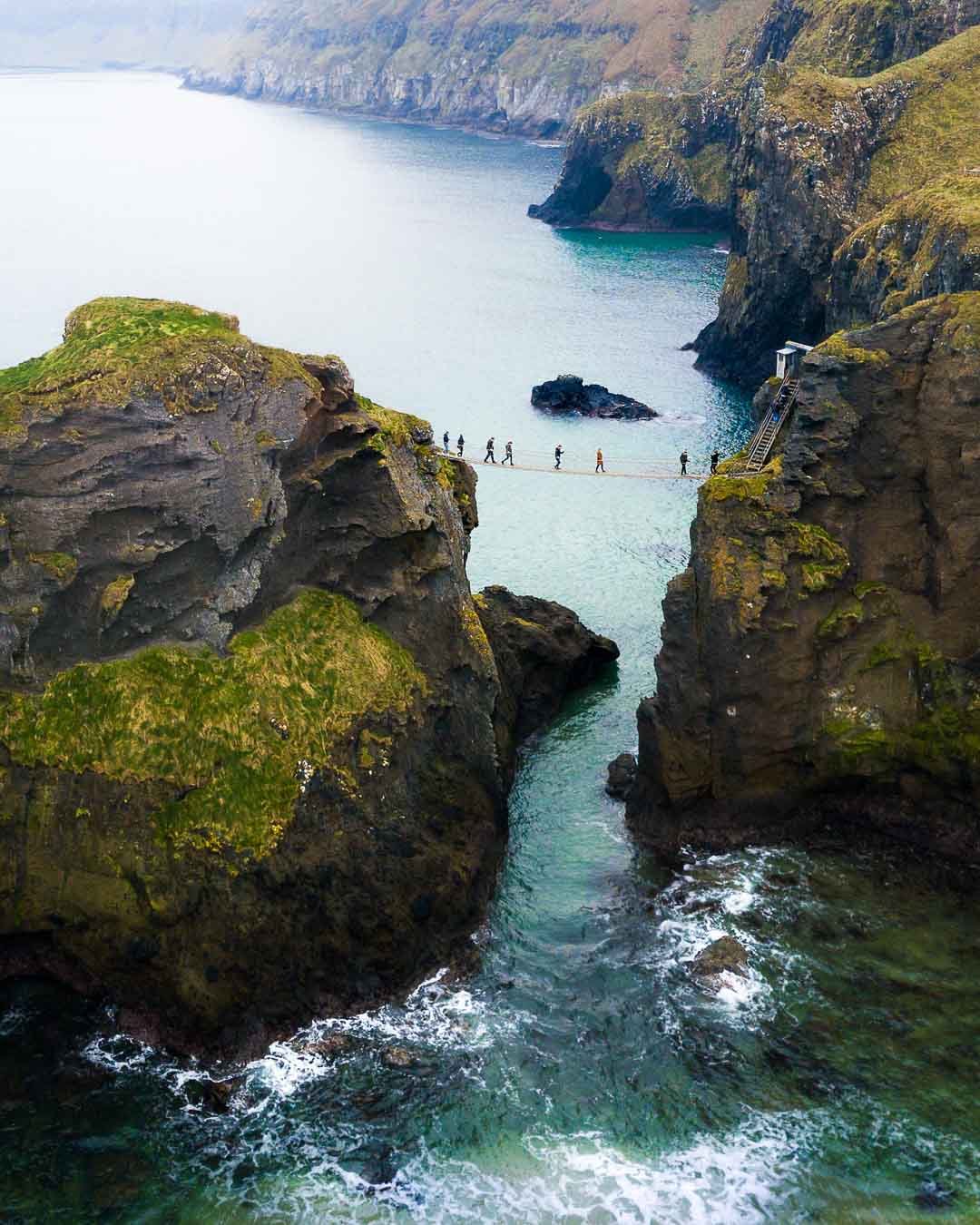
Carrick-a-Rede is indeed popular because of the rope bridge that connects the mainland to the rock that got separated from the mainland. This rope bridge was built by fishermen 350 years ago to reach the salmons behind the rock named Carrick Island.
Contrary to what you may think, the rope bridge suspended more than 30 meters high above the sea is entirely safe. But you’ll still need guts to cross it!
35. The Mourne Mountains
The Mourne Mountains are situated about 1 hour drive from Belfast and features Northern Ireland’s highest peaks.
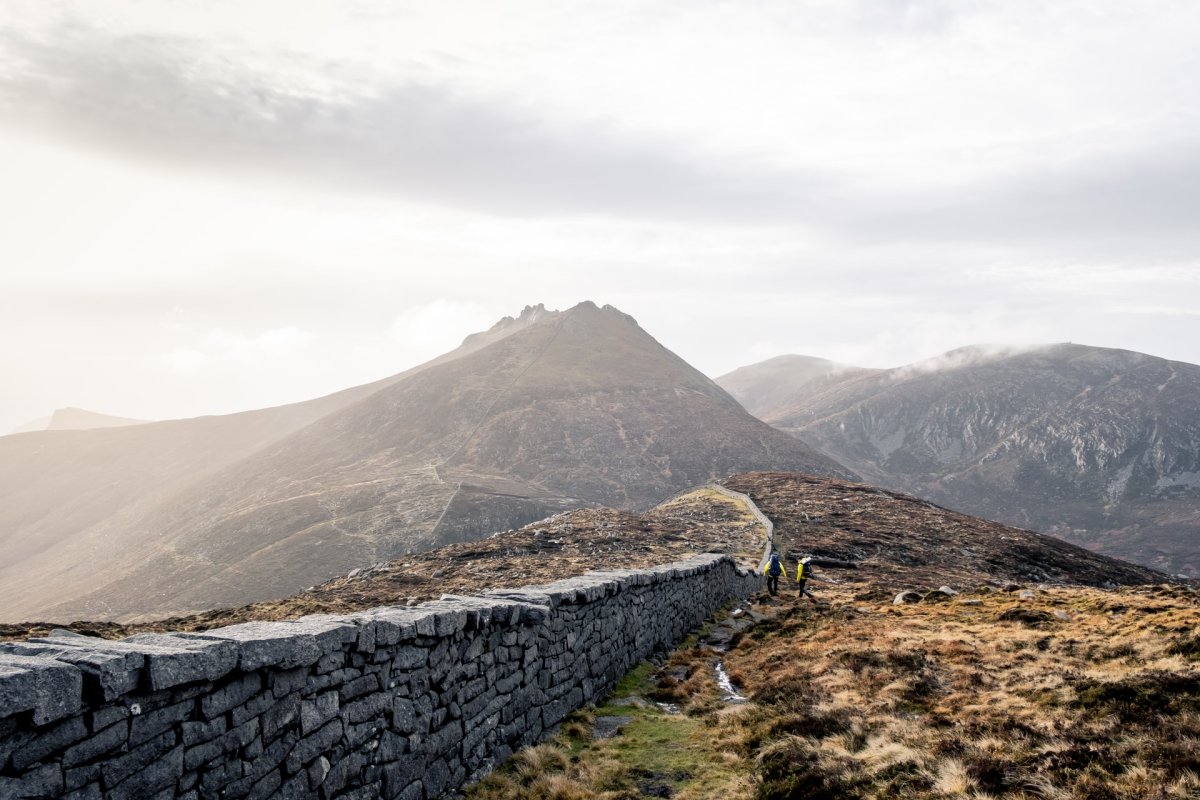
The Mourne Mountains are a must for nature and hiking lovers, especially because of the Slieve Donard, the highest peak rising at 850 meters. There are 10 other peaks ranging from 500 to 750 meters.
Even though the peaks aren’t too high compared to others, some are incredibly difficult to climb. Hopefully, you can find easier hiking trails suitable for beginners. While hiking, you might see the Mourne Wall, a stone wall extending for 35 kilometers.
36. Isle of Skye
The Isle of Skye is the biggest island in the Inner Hebrids and one of Scotland’s most wonderful places.
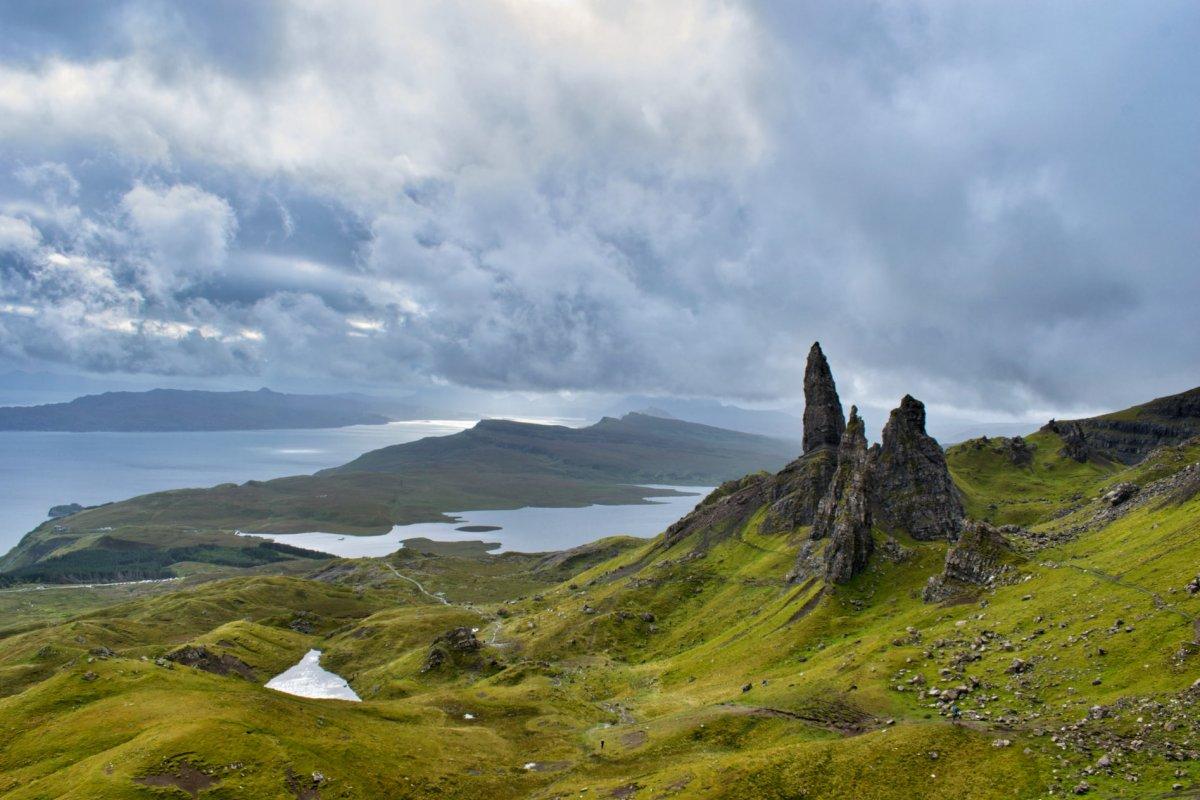
The landscapes of the Isle of Skye are certainly what you have in mind when thinking of Scotland. The island is full of gems you may have heard of, like the Old Man of Storr, the Quiraing, or Kilt Rock to name but a few, and you can’t miss any of them if you’re around.
The island is becoming more and more popular over the years due to the many movies and TV shows shot there. But hopefully, the island remains quite untouched for the moment.
37. Glen Coe
Glen Coe is a green and wild valley in the heart of the Scottish Highlands encircled by high mountains.
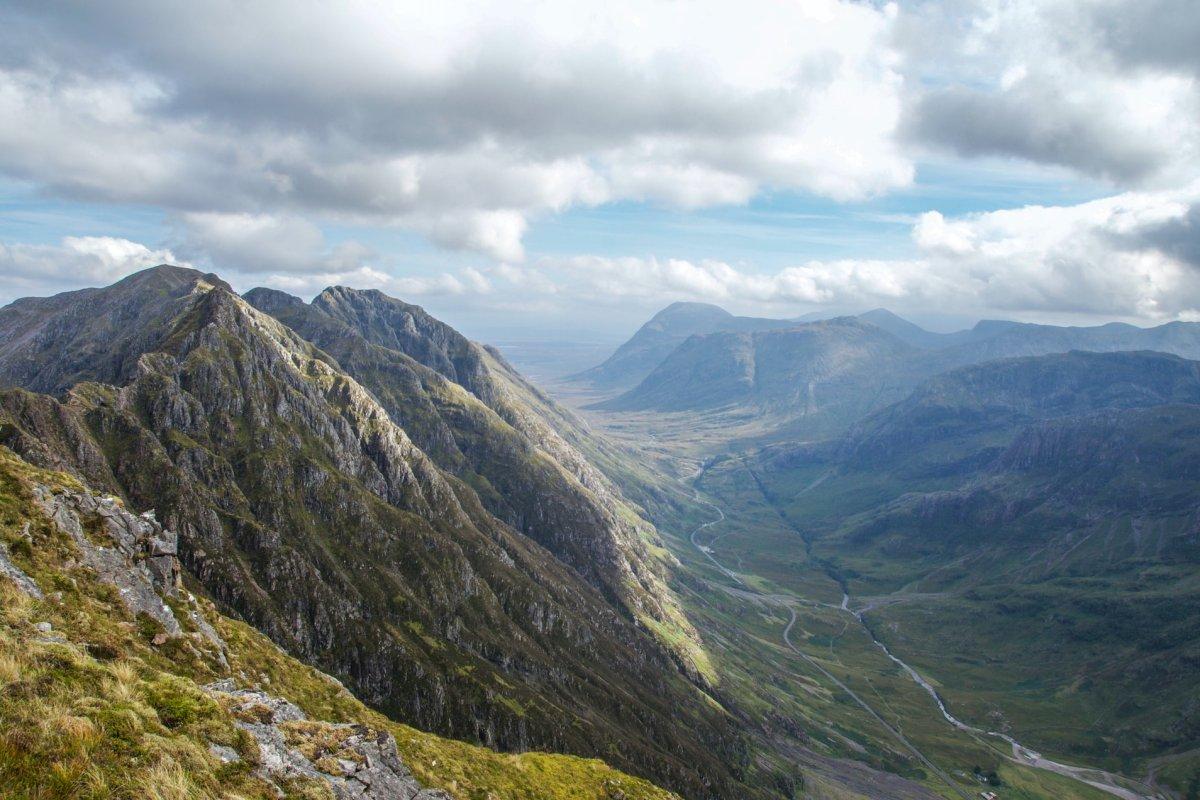
Like many other Scottish sites, Glen Coe served many times as a filming location, such as for Braveheart, Harry Potter, or James Bond. But the area is also sadly known for the Glen Coe Massacre that took place in 1692.
Hikers and climbers flock from all around the world to try the countless trails and slopes. Definitely one of the most beautiful places in Scotland, where nature remains untamed.
38. Loch Ness
The Loch Ness is arguably the best-known site and legend from Scotland. Situated inside the Highlands, the lake is world-famous for the monster that is said to live in its waters, Nessie.
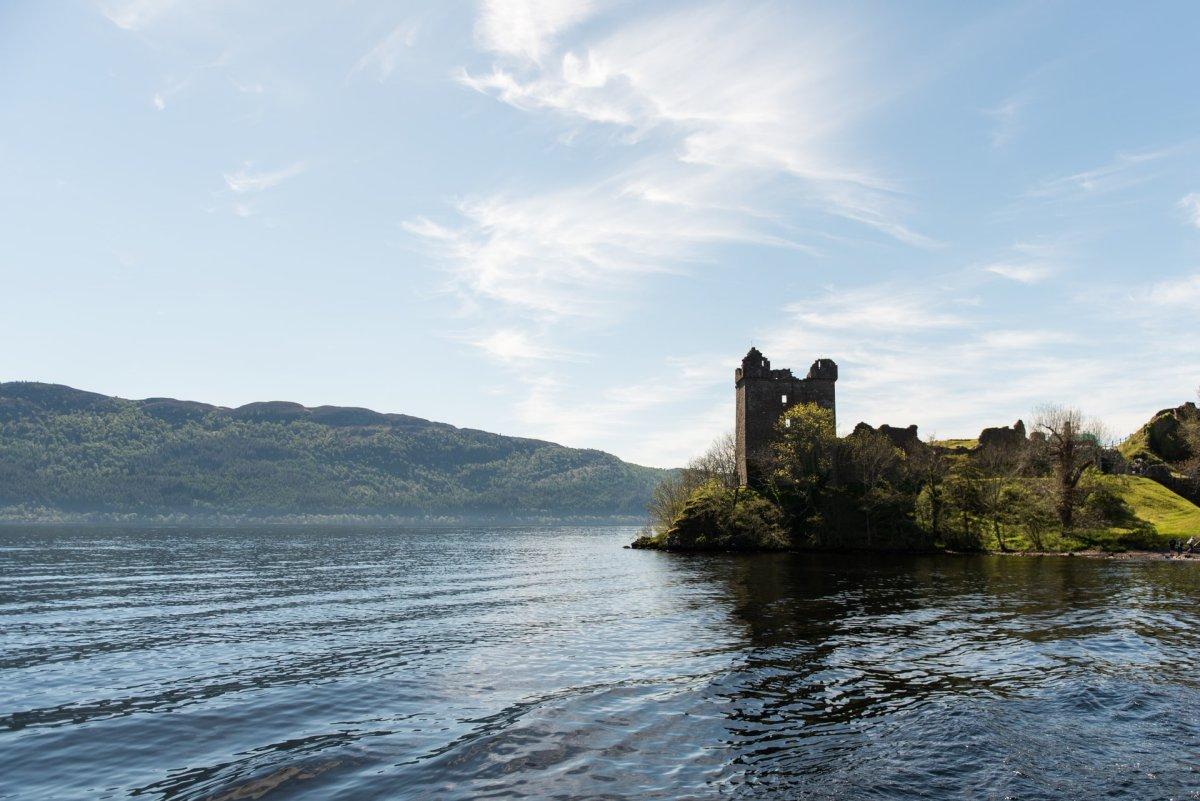
The story of Nessie finds its roots in 565 when a monk is said to have saved a disciple from death while he was swimming across the lake.
Outside this legend, Loch Ness is also Scotland’s second-largest loch after Loch Lomond with 39 kilometers long. You should also know that visiting Loch Ness isn’t scary, on the contrary. It’s a beautiful lake surrounded by green lush and amazing nature with a remarkable fortress, Urquhart Castle.
39. Pembrokeshire Coast
The Pembrokeshire Coast is a national park located in Wales covering an area full of stunning coastal landscapes, golden beaches, and picturesque villages.
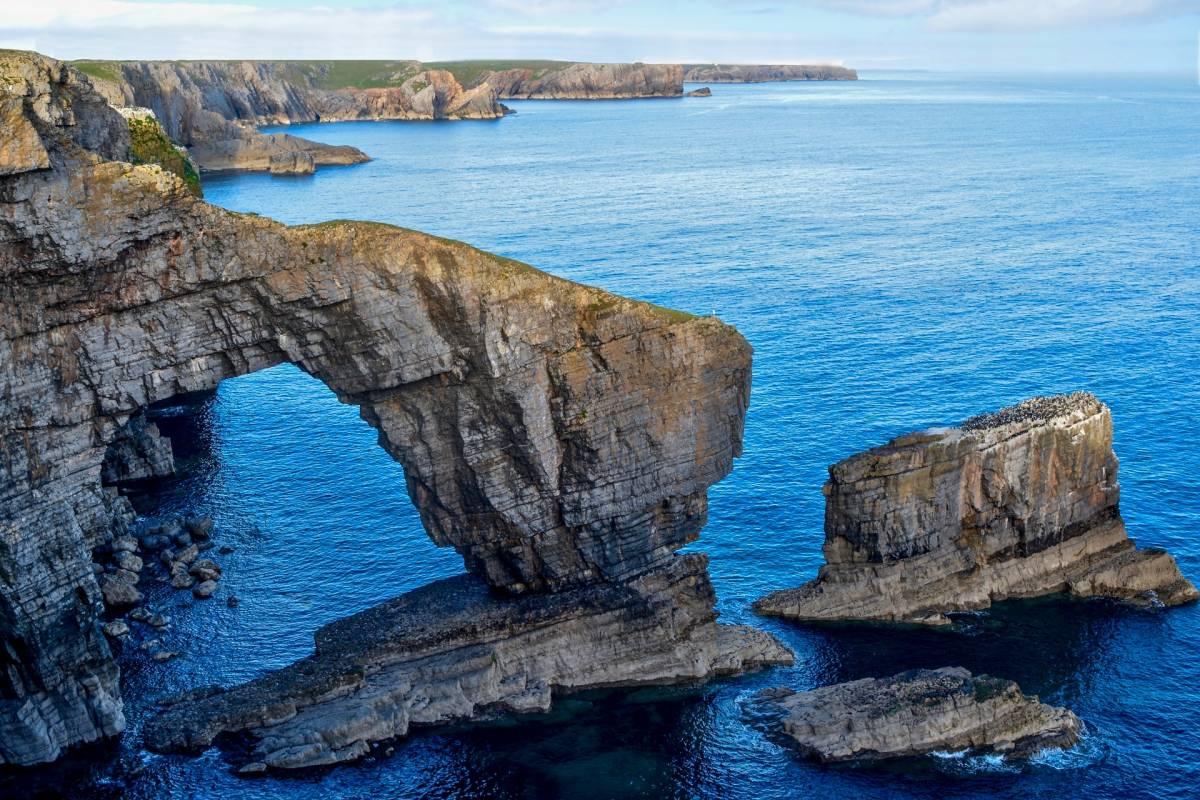
The Pembrokeshire Coast is a paradise for hikers as they can find about 300 kilometers of trails there! And these trails are particularly beautiful as most of them are on the coast and offer views of both the sea and the green landscapes.
People come here above all for watching seals and dolphins, or coasteering.
40. Snowdonia
Snowdonia is another Welsh national park, the largest of the country, but of a different kind.
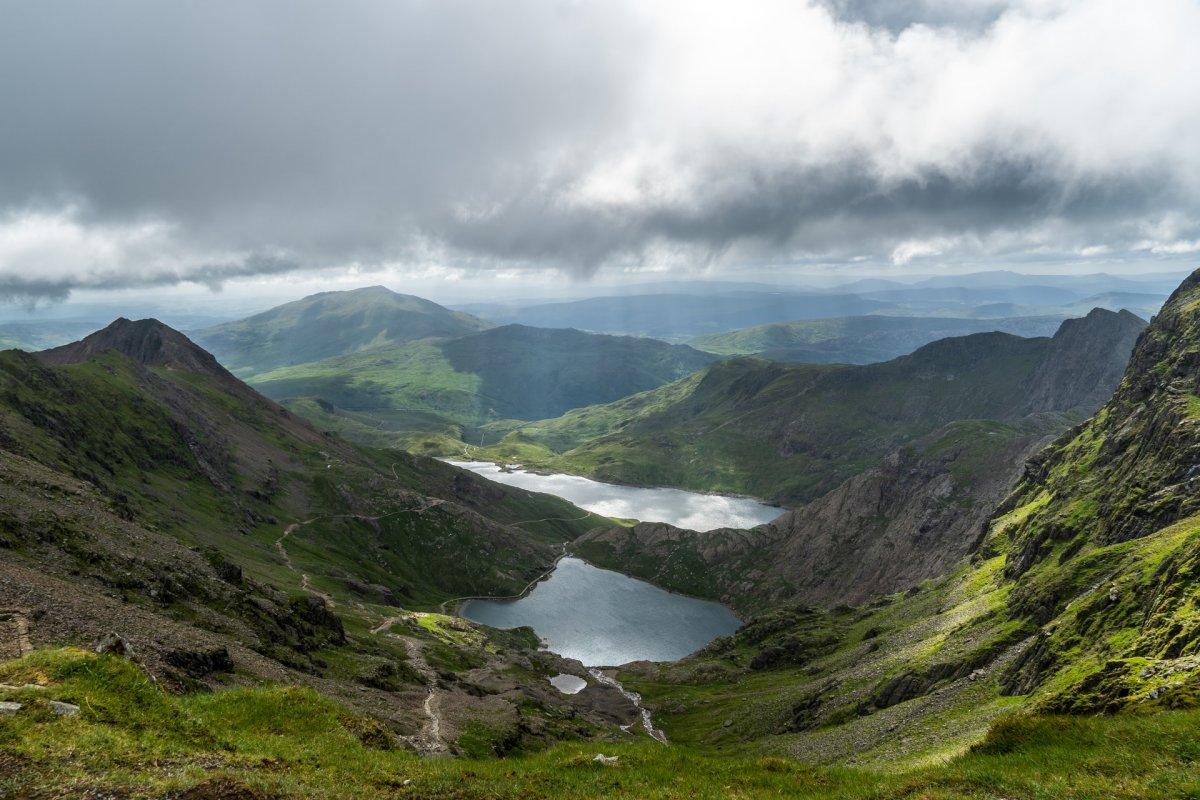
Snowdonia is home to England’s highest peak, Mount Snowdon rising at 1,085 meters above the ground. Visitors can reach the summit either by riding the Mount Snowdon Railway or by taking one of the 5 hiking trails for the bravest.
Stretching over 318 square kilometers, Snowdonia also offers a unique landscape with a plethora of things to do and see, especially many charming villages such as Portmeirion that are well worth a visit.
So, here are the 40 great British landmarks to put on your bucket list. But I’m not done yet!
Keep reading to discover 30 more wonderful spots that could’ve been in the top 40 above 👇
More Famous Landmarks of the UK
The United Kingdom has such a rich heritage it was impossible to keep this list of British landmarks under 40. We’ve added 30 more landmarks you should visit if you’re around, breakdown by nation (England, Wales, Scotland, and Northern Ireland).
Let’s jump right to it! 🚀
Landmarks in England
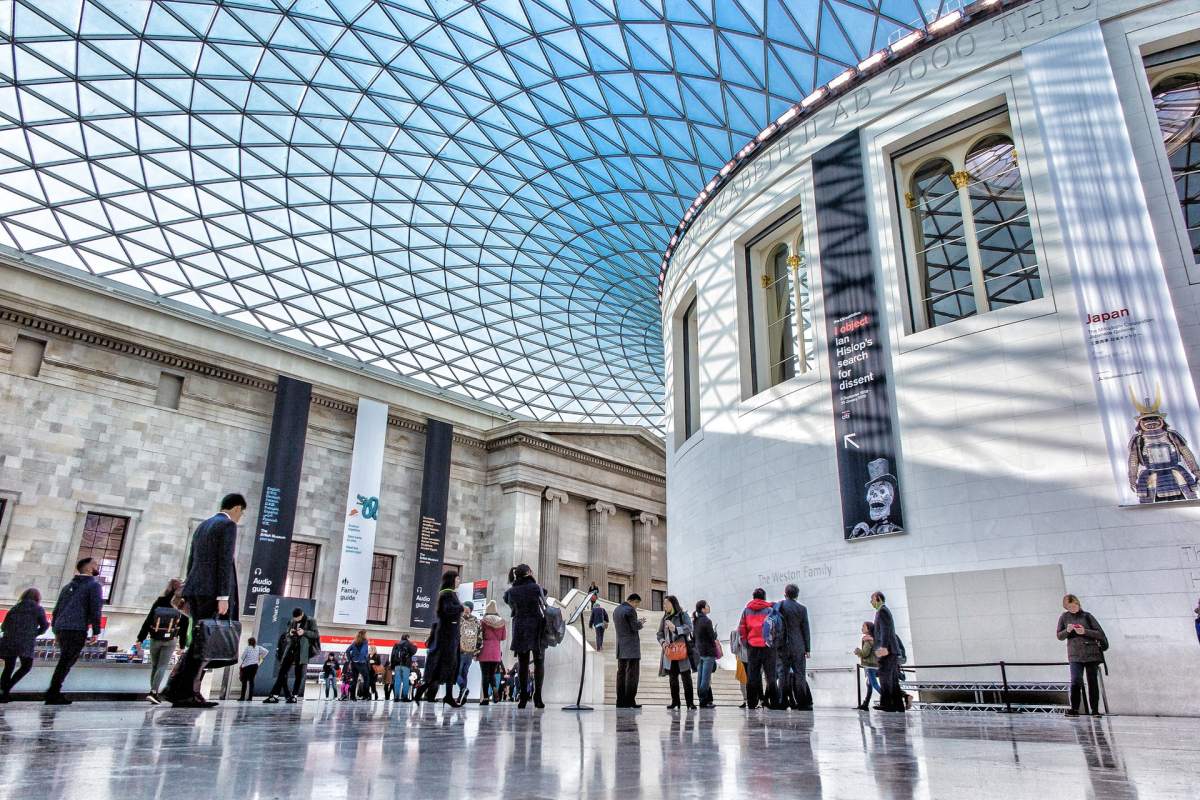
The British Museum
- The British Museum
- Eden Project
- Leeds Castle
- Angel of the North
- Coventry Cathedral
- Hampton Court Palace
- York Minster
- Blackpool Tower
- Cheddar Gorge
Read more: Most Famous Landmarks in England
Landmarks in Wales
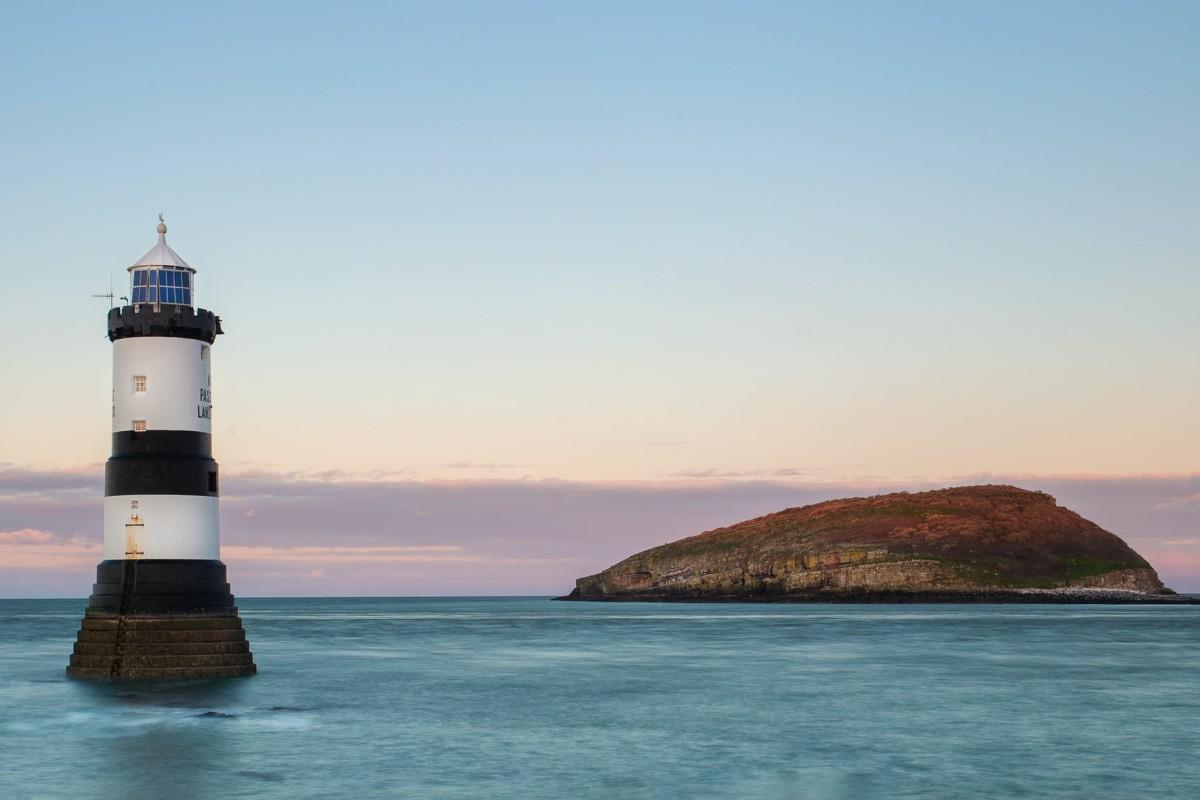
Anglesey
- Anglesey Island
- Pontcysyllte Aqueduct
- Wales Millennium Centre
- Conwy Castle
- Brecon Beacons National Park
- Tintern Abbey
- Devil’s Bridge Falls
Read more: Most Famous Landmarks in Wales
Landmarks in Scotland
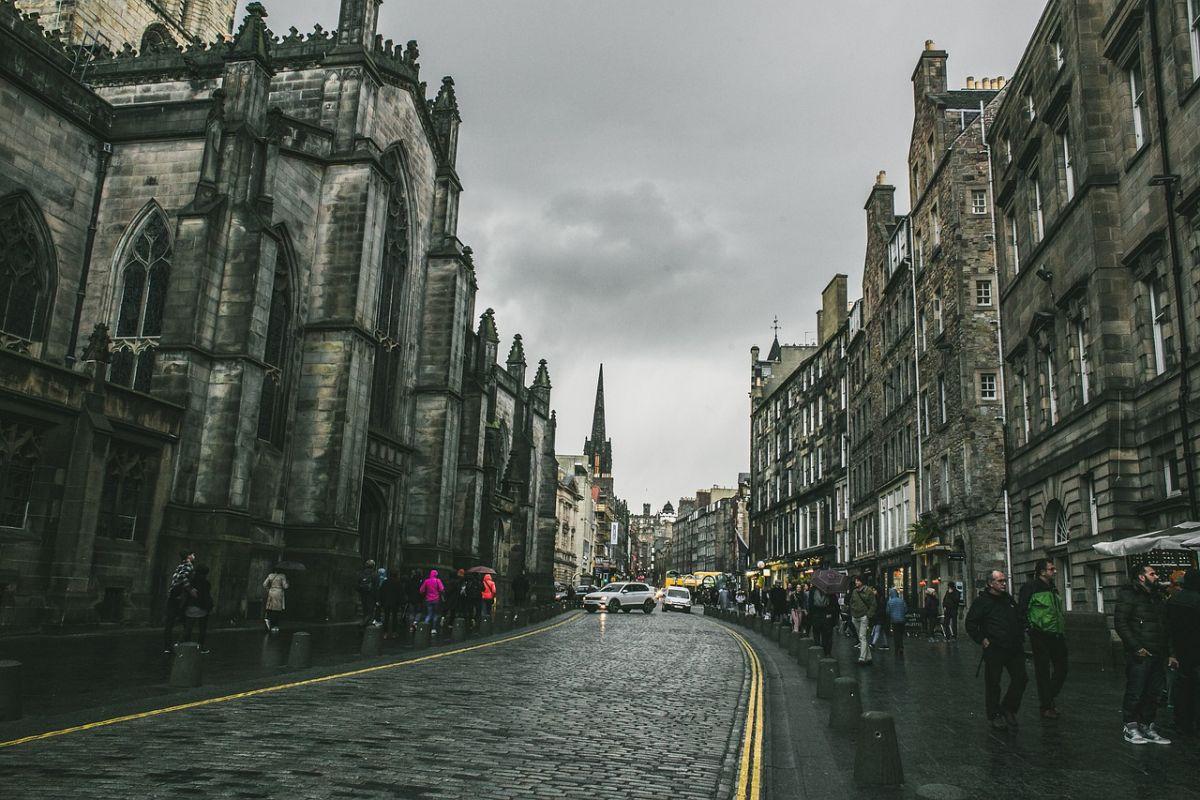
The Royal Mile
- The Royal Mile
- Scott Monument
- Arthur’s Seat
- Palace of Holyroodhouse
- St Giles’ Cathedral
- Skara Brae
- Loch Lomond
- University of Glasgow
- Callanish Standing Stones
Read more: Most Famous Landmarks in Scotland
Landmarks in Northern Ireland
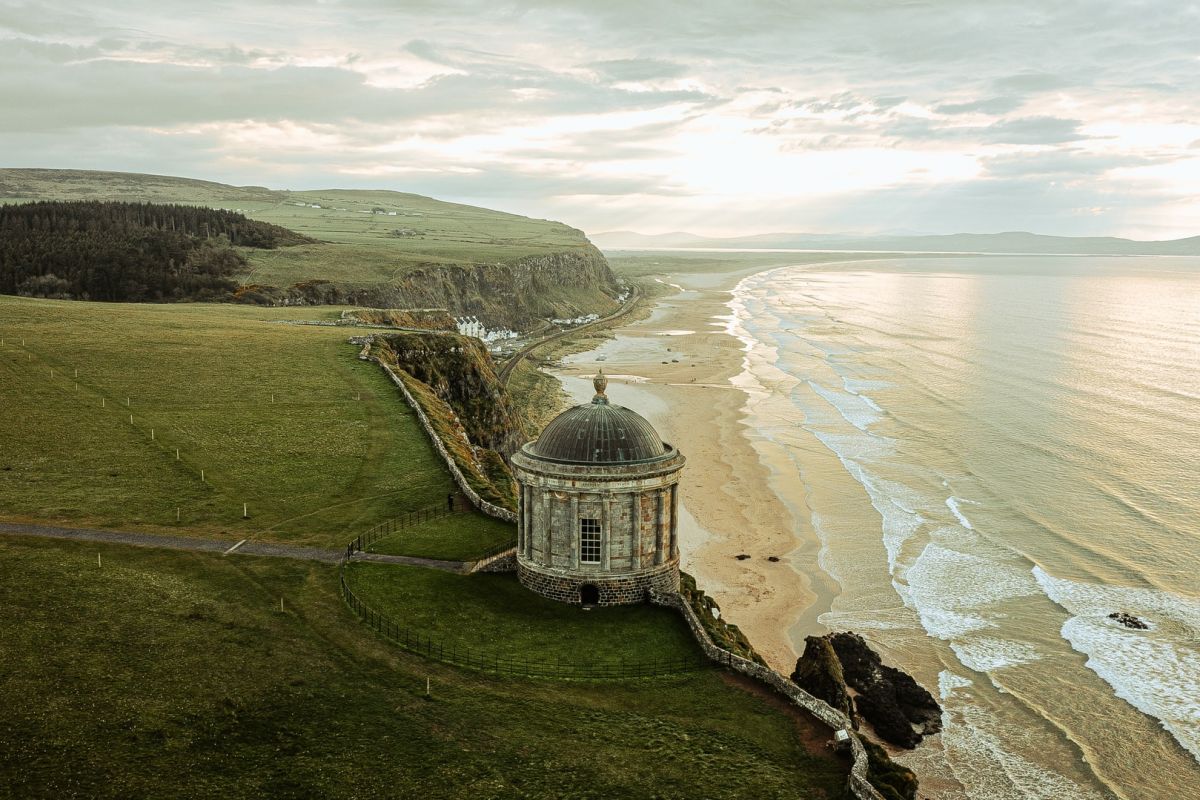
Mussenden Temple
- Mussenden Temple
- Belfast Castle
- The Titanic Belfast
- Ulster Museum
- Torr Head Scenic Road
Read more: Most Famous Landmarks in Northern Ireland
Hooray! You’ve made it to the end of this list of the famous landmarks in UK! 🔥
But wait, I have one last bonus for you, right below.
Map of the Famous British Landmarks
Here’s the map of the most famous landmarks of the UK. To get it, simply click on the image below to open it in Google Maps. Then click on the “star” icon to save it to your own maps.
More UK Landmarks
Did you like this list of all the United Kingdom famous landmarks? If yes, then discover more iconic British landmarks in these posts below!
Find the landmarks in the UK by nation:
- Famous Landmarks in England
- Famous Landmarks in Wales
- Famous Landmarks in Scotland
- Famous Landmarks in Northern Ireland
Find the best landmarks in the UK by city:
- Famous Landmarks in London
- Famous Landmarks in Manchester
- Famous Landmarks in Liverpool
- Famous Landmarks in Bristol
- Famous Landmarks in Birmingham
- Famous Landmarks in Leicester
- Famous Landmarks in Cardiff
- Famous Landmarks in Edinburgh
- Famous Landmarks in Glasgow
- Famous Landmarks in Belfast
For more, you can also check all our UK guides.
I hope you’ve found all the information you needed to make your UK bucket list through these posts. Don’t hesitate to comment below if this is the case, I would be very pleased to read your feedback!
Loved this post? Share it with your friends by using the buttons below, I’m sure they’ll love it 🙂
Pin this to Pinterest!
Enjoyed this guide? Then help a fellow traveler and pin it! They'll most definitely love you for it, 100% guarantee.

